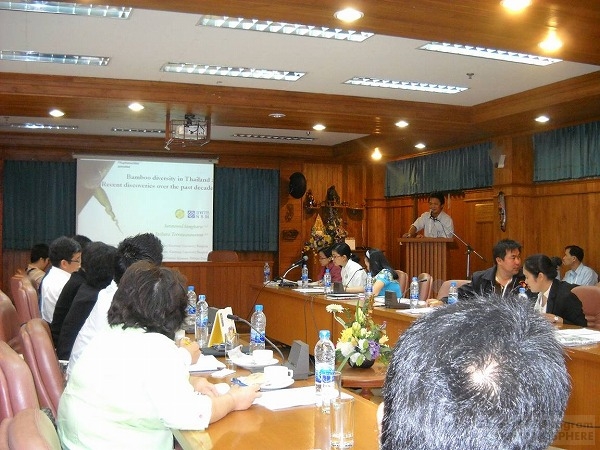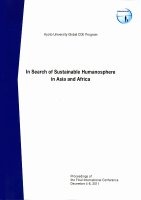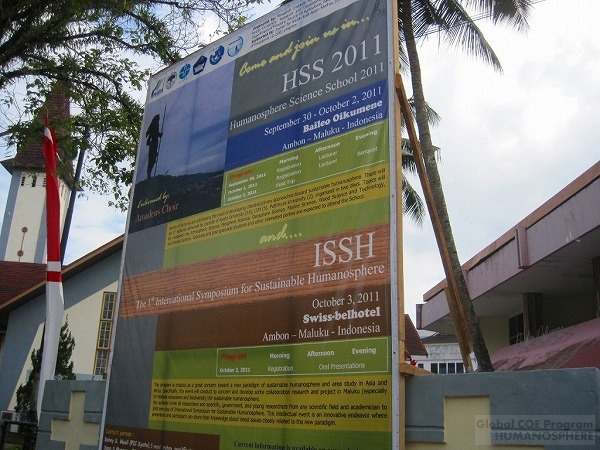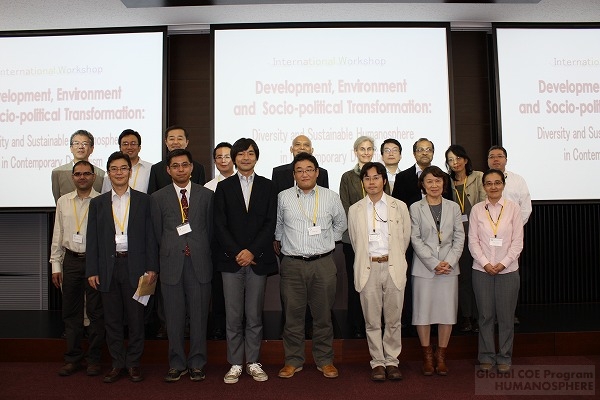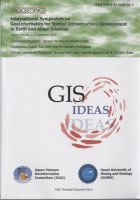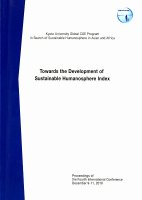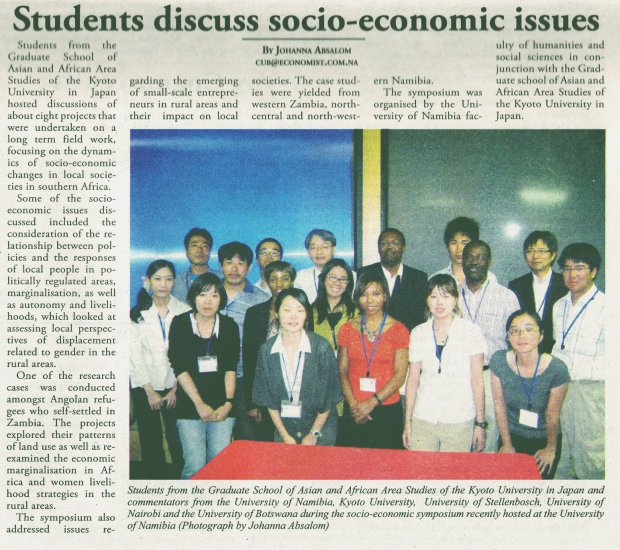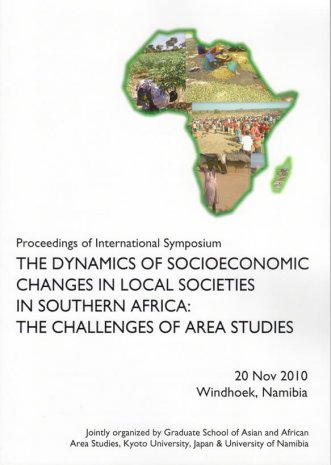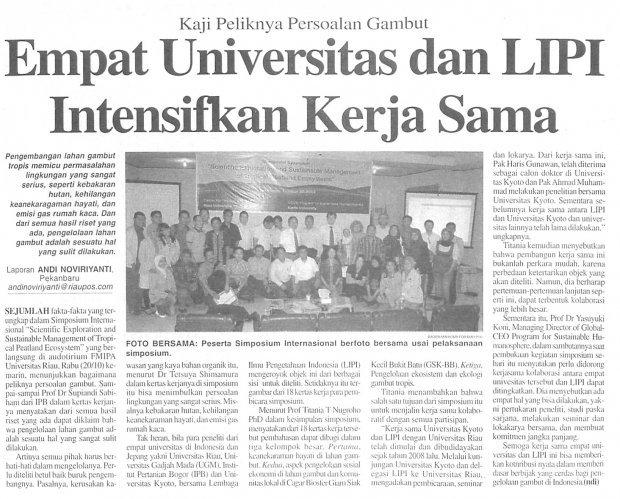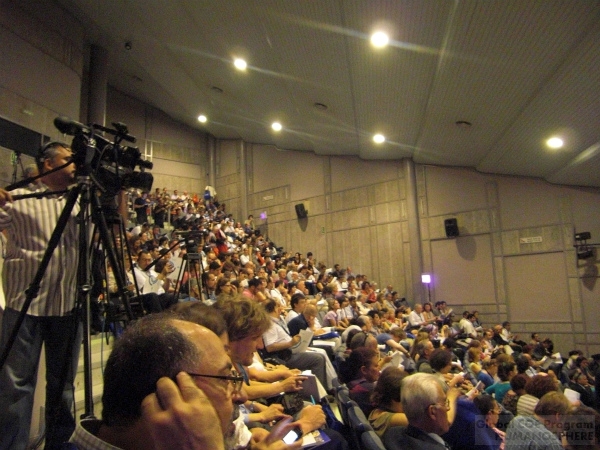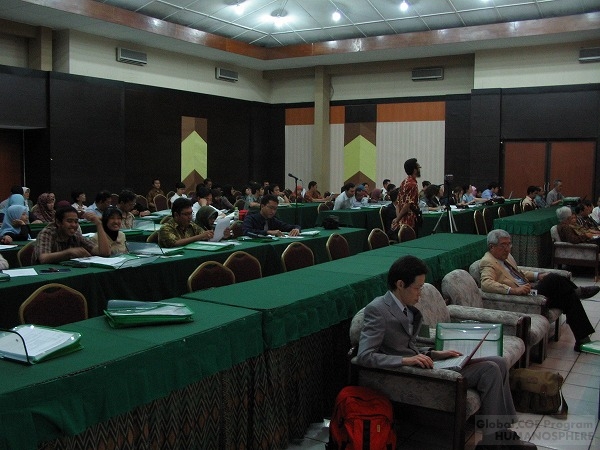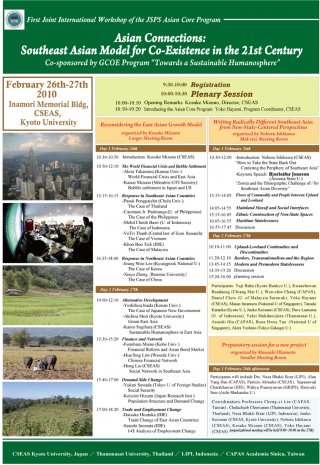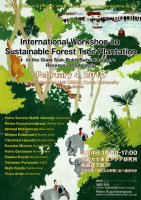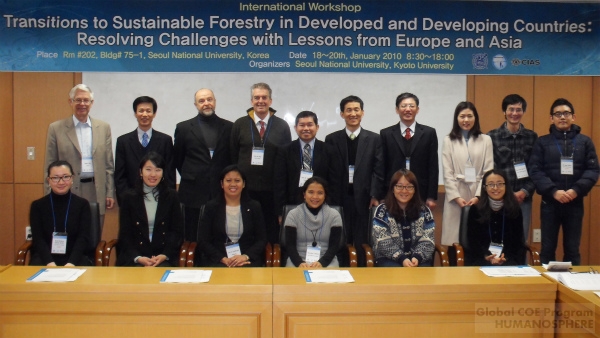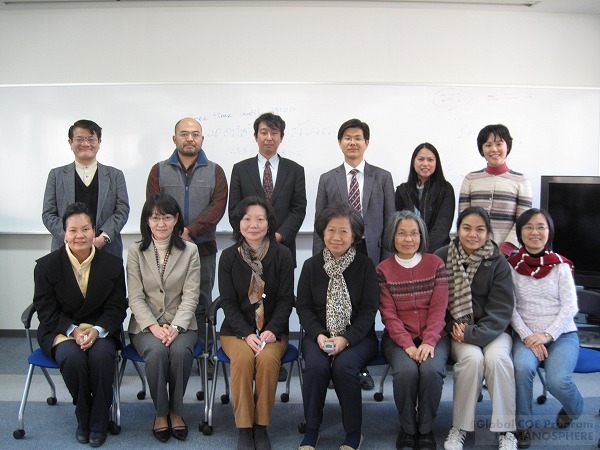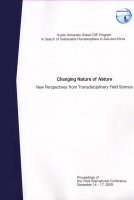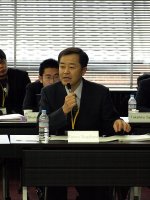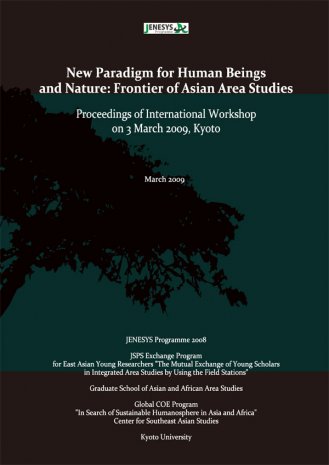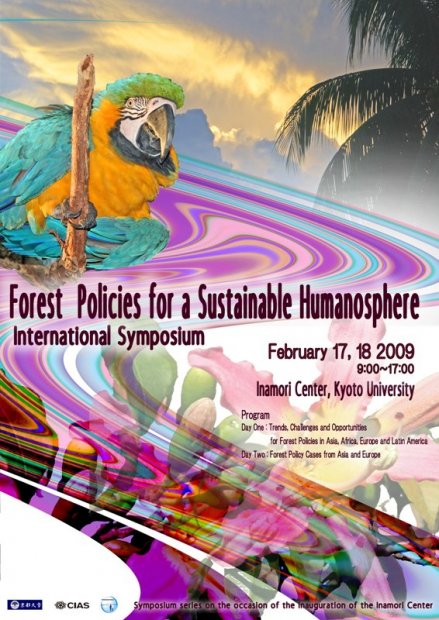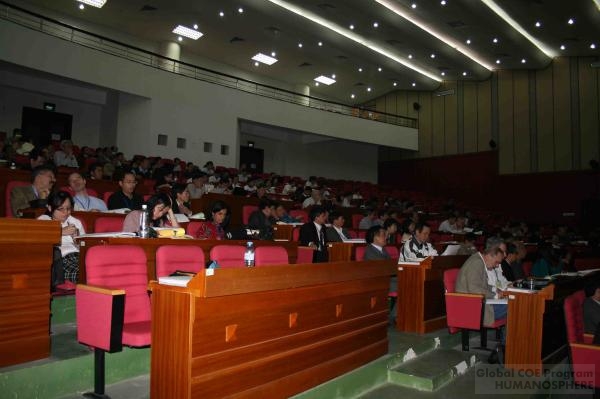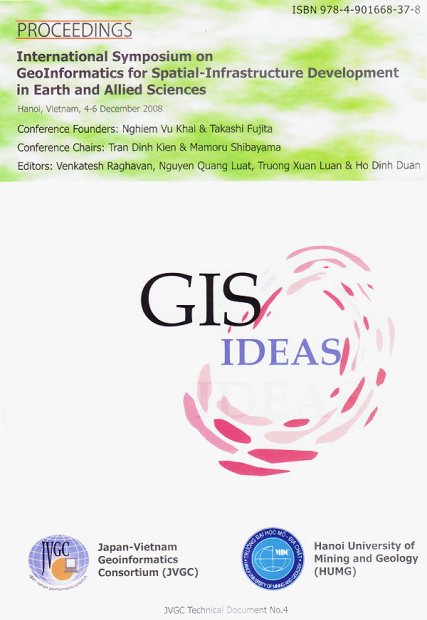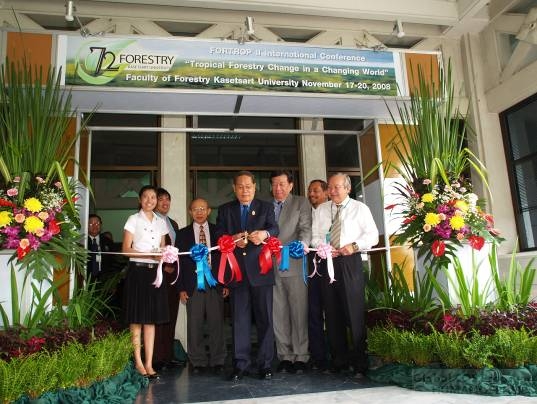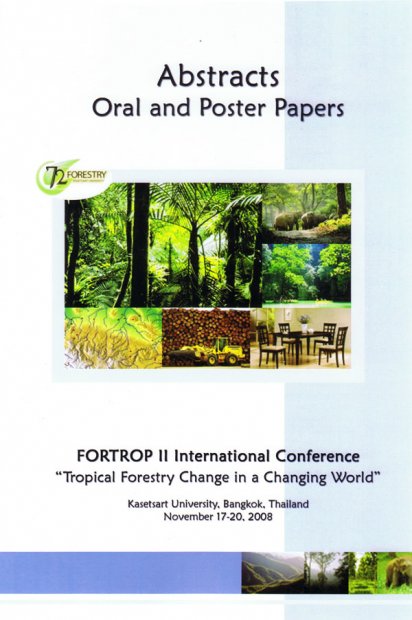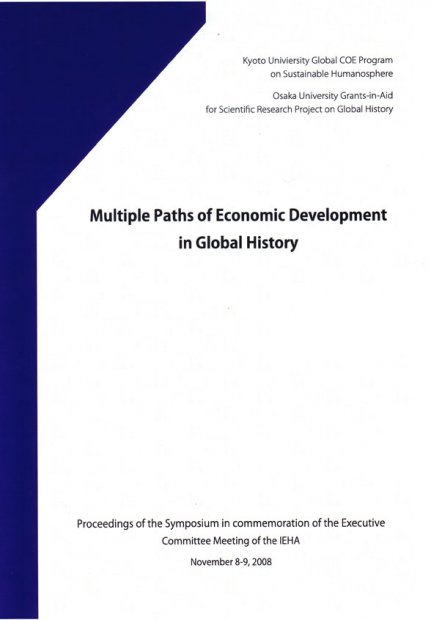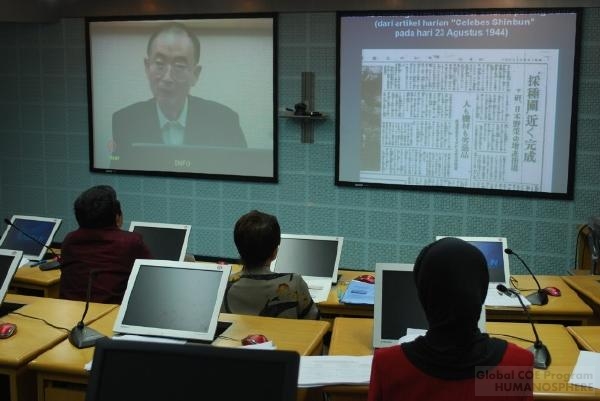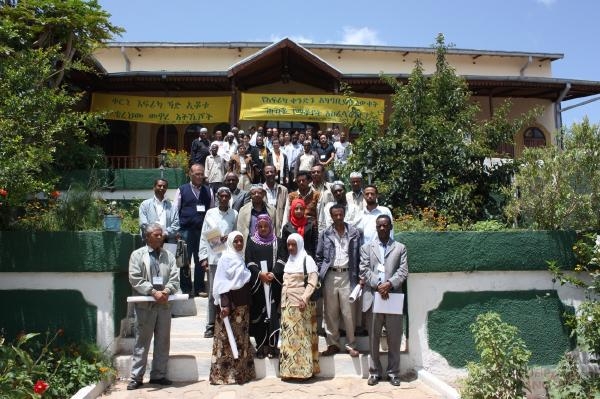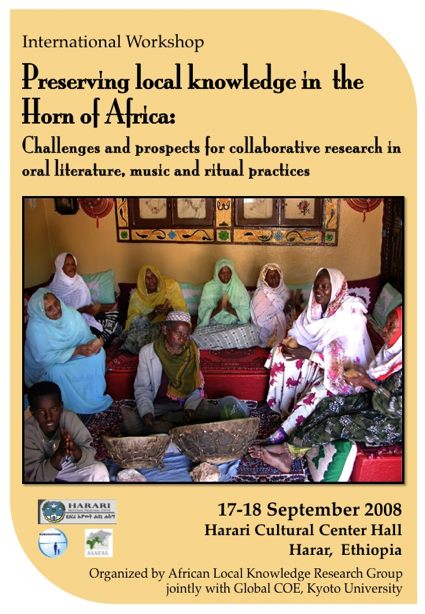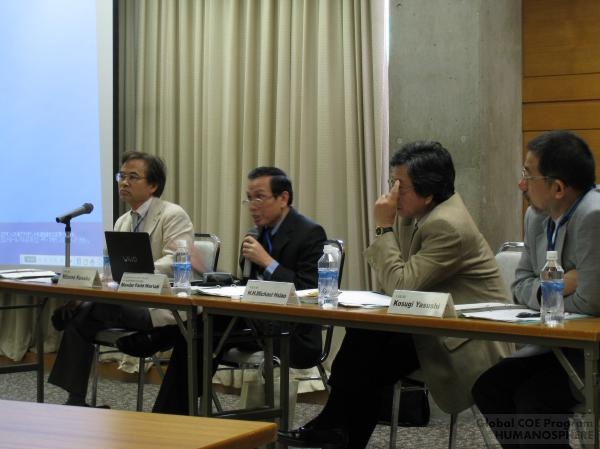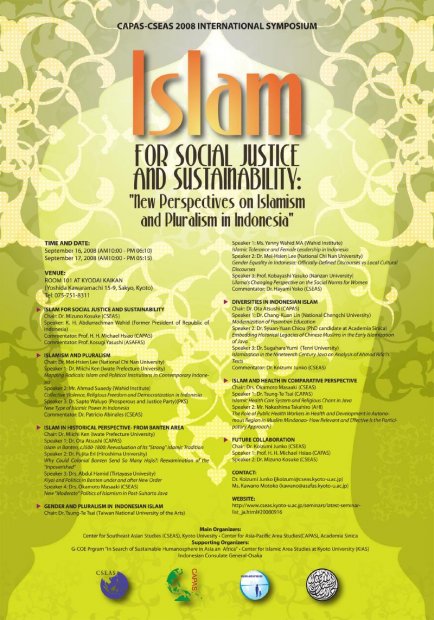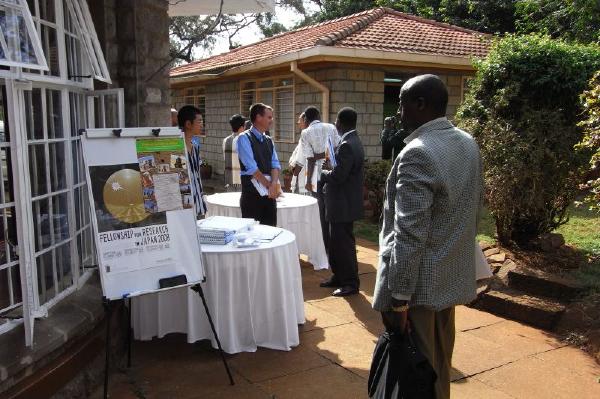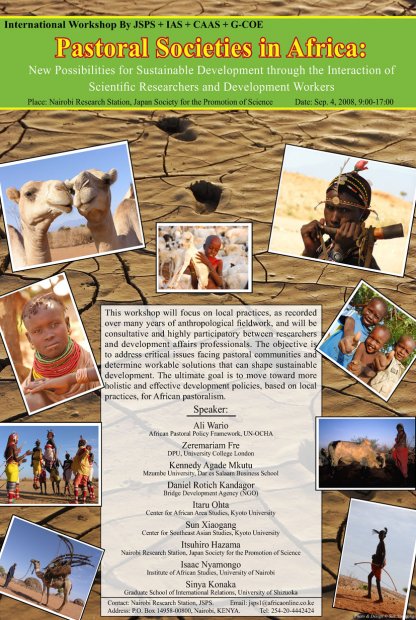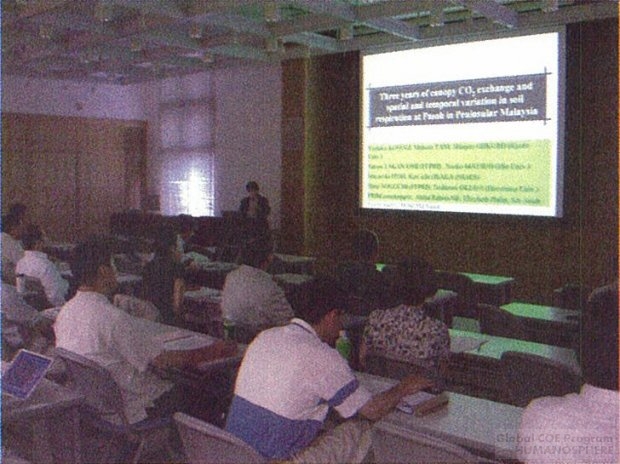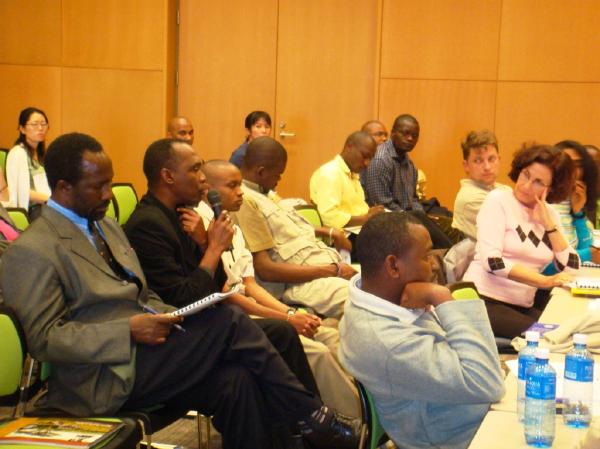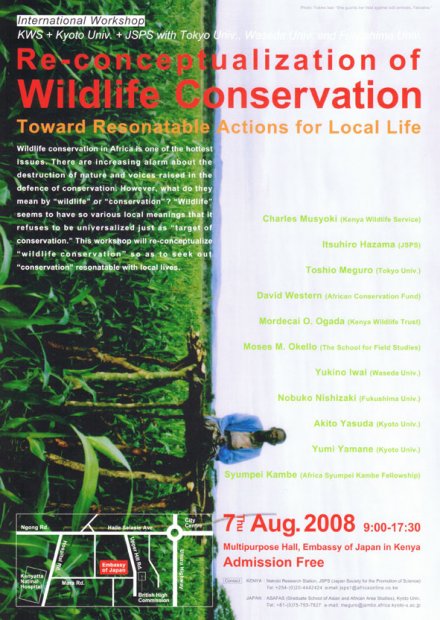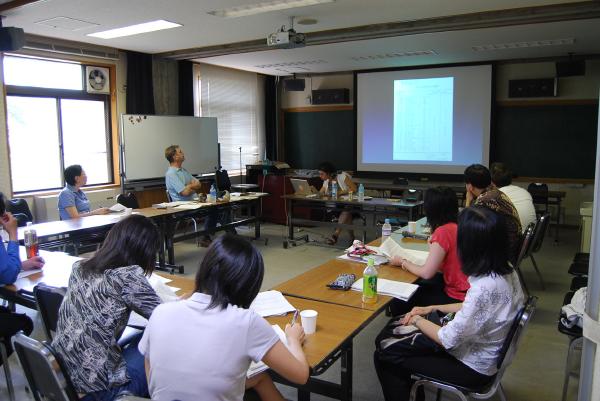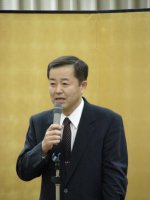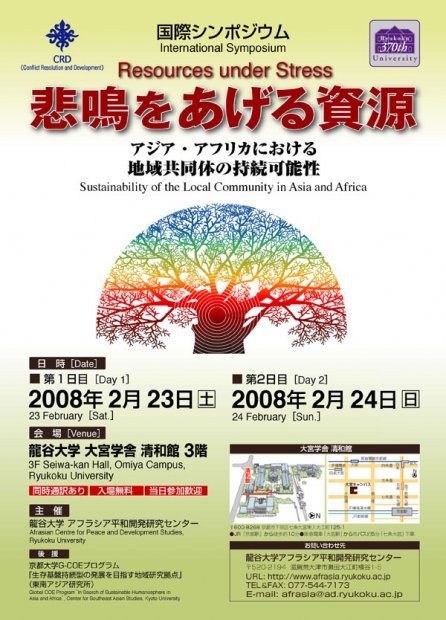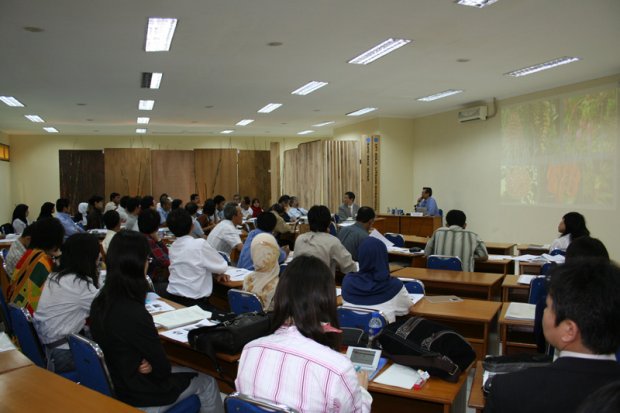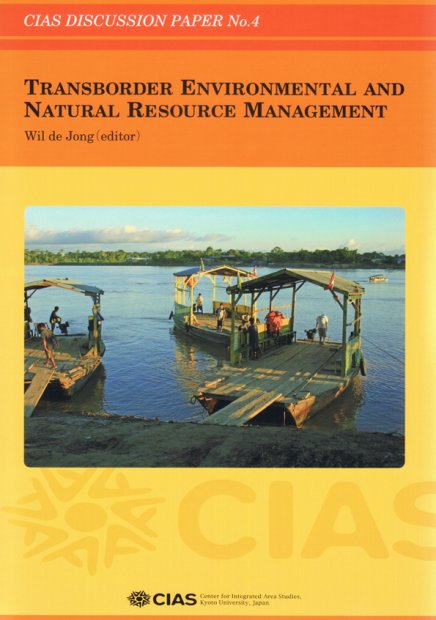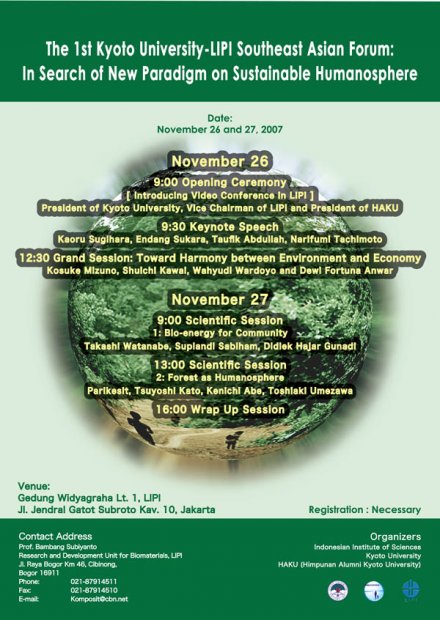International Workshop(International Confereces/International Symposia)
Date: 13-14, February 2012
Venue: Yangon, Myanmer
Co-organization:
FREDA, G-COE, Green & Life project.
International Workshop(International Confereces/International Symposia)
Date: 28, January 2012
Venue: LSE, London 、the conference room at STICERD
Title: The diversity-driven path of economic development: small-scale production, commodity consumption and socio-cultural representation in modern India
It is hosted by the department, and jointly funded by 3 research programmes/institutions in Japan, "Young Researcher Overseas Visits Program for Vitalizing Brain Circulation”(JSPS, Japan), "Contemporary Indian Area Studies (INDAS) "(NIHU, Japan), "In Search of Sustainable Humanosphere in Asia and Africa" ( Kyoto University Global COE Program).
International Workshop:Sustainable local development using the wise utilization of bamboo resources (International Confereces/International Symposia)
Date: January 15-16, 2012
Venue: Kasetsart University, Bangkok, Thailand
Co-organization:
Kasetsart University
"Forest Conservation and International Climate Policy"(International Confereces/International Symposia)
Date: 12-13 January 2012
Venue: Wageningen, Netherlands
Co-organization:
Forest and Nature Conservation Policy Group, Wageningen Agricultural University
The 5th "Asian and African Perspectives of Sustainable Humanosphere"G-COE International Conferece 2011
Date:December 4-6, 2011
Venue:No. 333, Inamori Foundation Memorial Hall, CSEAS, Kyoto University
Title: "Asian and African Perspectives of Sustainable Humanosphere"
【Summary】
The objective of the fifth international symposium is to explore, as broadly as possible, how we can create conditions for “sustainable humanosphere” in Asia and Africa. By setting the humanosphere as the basic unit for analyzing the sustainable human environment and defining the ‘survivability’, ‘reproduction’ and/or ‘sustainability’ as the material and psychological conditions necessary for an individual or a community to survive sustainably, our ultimate goal is to identify concrete ways in which we can create a sustainable humanosphere in local, regional, and global contexts. (tentative)
"International Workshop on Islamic Economics: Challenges and Prospects in Islamic Finance"(International Confereces/International Symposia)
Date:18,19 February 2012
Venue: Kyoto University
Co-organization:
Center for Islamic Area Studies at Kyoto University, (Durham Islamic Finance Programme)
"International Workshop on Islamic and Middle Eastern Studies: Towards a New Theoretical Framework for Understanding Politics, Economy and Muslim Societies in the Middle East"(International Confereces/International Symposia)
Date: 8-9 October 2011
Venue: Kyoto University
Co-organization:
Center for Islamic Area Studies at Kyoto University, Tokyo University of Foreign Studies
The 2nd International Workshop On South South Cooperation (SSC) for Sustainable Development in the Three Major Tropical Humid Regions in the World(International Confereces/International Symposia)
Date: 4-8 October 2011
Venue:Pekanbaru, Indonesia
Presenation:
1.Kosuke Mizuno, Kazuo Masuda
Socioeconomic challenges for sustainable management of a tropical peat land ecosystem and proposal of people’s forest
2.Hiromitsu Samejima,Motoko S. Fujita, Dendy Sukma Haryadi and Ahmad Muhammad
Biodiversity inventory in a peat-swamp area -Mammals & Birds-
3.Kazuo Watanabe, Shuichi Kawai
「Land Use and Biomass on the Peat Swamp Area in The Giam Siak Kecil- Bukit Batu Biosphere Reserve」
4.Haris Gunawan, Shigeo Kobayashi, Kosuke Mizuno, Kono Yasuyuki, Osamu Kozan
Peatswamp Forest and Restoration Experiments to Promote the Local Community Livelihood and Ecosystem Services Functions in Riau Biosphere Reserve, Indonesia.
"Wallace ecosystem and biodiversity in Maluku for sustainable humanosphere"(International Confereces/International Symposia)
Date: 3 October 2011
Venue: Swiss belhotel Ambon
Jln. Benteng Kapaha, Ambon, Maluku, Indonesia
http://www.swiss-belhotel.com/
Organized by:
Research Institute for Sustainable Humanosphere (RISH) Kyoto University,
Research and Development Unit for Biomaterials-LIPI,
Department of Forestry, Faculty of Agriculture, Pattimura University, Ambon
Supported by:
Center for South East Asian Studies (CSEAS),
Global Center of Excellence (G-COE) program
This is an announcement of the International Symposium for Sustainable
Humanosphere to be hold on October 3, 2011 at Swiss-belhotel, Ambon – Maluku - Indonesia.
The participants in the symposium include the following.
Theme
“ Wallace ecosystem and biodiversity in Maluku for sustainable
humanosphere ”
Background
The program is created as a great concern toward a new paradigm of
sustainable humanosphere and area study in Asia and Africa.
Specifically, this event will conduct to concern and develop some
collaboration research and project in Maluku (especially for Wallace
ecosystem and biodiversity) for sustainable humanosphere.
We cordially invite all researchers and scientific, government, and
young researchers from any scientific field and academician to joint
one-day of International Symposium for Sustainable Humanosphere. This
intellectual event is an innovative endeavor where presenters and
participant can share their knowledge about latest issues closely
related to the new paradigm.
This program will be more concern to establish research collaboration
and project around Wallace ecosystem and biodiversity in Maluku for
sustainable humanosphere.
Call for paper
Authors are kindly invited to submit an abstract related to the topic of
the symposium. Abstract should include title, author(s) name,
affiliation(s) and main text (100-300 words). The type of the
presentation; oral or poster is also requested to be informed when you
send an abstract. A paper submission is also required. Please note also
that deadline for abstract is August 19, 2011 and for full paper is
September 16, 2011. The abstract and full paper formats are available in
our website. The soft copy (word file) of the abstract and full paper
should be submitted to symposium secretariat by using our website
(http://biomaterial.lipi.go.id/hss2011) or send to
ari.kusumaningtyas[at]yahoo.com/ ari.kusumaningtyas[at]gmail.com.
Topics
The 1st ISSH 2011 covers all kinds of topics related to humanosphere
such as:
1. Atmospheric Science: Equatorial Atmosphere; Space Environment,
Radar Observations; Air Pollution Dispersion Model; Climate and Weather
of the Sun-Earth System; Solar Activity and Space Weather
2. Biosphere Science : Animal ecology; Bio-indicator; Anthropological
Approaches; Human Development Index; Empowerment of Local Communities;
Ecosystem and Community
3. Geosphere Science : Land Resource Management Option for Global
Warming Mitigations; Heat, Water and CO2; Carbon Cycle and Sink in
Several Forest Ecosystem Types; Water Management System
4. Marine Science : Development of Marine Ecosystem, Fishery Products
Processing.
5. Wood Science and Technology : Wood Cell Wall Formation; Cellulose;
Wood Biochemistry; Wood Deteriorating Organisms; Wood Preservation;
Timber Structure; Wooden Construction; Wood-based Material; Carbonized
Wood Based Composites; Wood Adhesives; Chemical, Physical and Mechanical
Properties of Wood; Biomass Conversion; Bio-composites; Wood for Energy;
Termites for New Energy Options; Urban Pest Management
6. Forest Science : Tropical Fast Growing Tree Studies; Structure,
Growth and Function; Tree Biotechnology; Genetically Modified Tress;
Biodiversity in Tropical Plantation Forests; Peat Swamp Forest
Ecosystem; Forest Biomass; Intensive Silviculture; Forest Fire and
Global Climate Change.
Program
Morning
Afternoon- Evening
October 3, 2011
Registration
Oral-PosterPresentations
Location :
Swiss belhotel Ambon
Jln. Benteng Kapaha, Ambon, Maluku, Indonesia
http://www.swiss-belhotel.com/
Registration fee :
*Accommodation (hotel) is not included.
Indonesian participant; Regular : Rp.150.000/person, Students :
Rp.100.000/person (including program book, lunch, coffee break).
Payment : Fee could be pay in the site or send to Bank Mandiri (Branch
of Cibinong), Account number : 133-00-1093-0063 holder Dwi Hadi R
Contact person :
Sasa S.Munawar, E-mail : sasasofyanm[at]biomaterial.lipi.go.id
Linda Kriswati, E-mail : lkris01[at]yahoo.com
Current information is available on our web site:
http://biomaterial.lipi.go.id/hss2011/
Humanosphere Science School (HSS) 2011(International Confereces/International Symposia)
Date: 30 September - 1 October 2011
Venue: Ambon, Indonesia
Co-organization:
RISH, The Indonesian Institute of Sciences (LIPI) JSPS Asia and Africa Scientic Platform Program
“Development, Environment and Socio-political Transformation in South Asia: Diversity and Sustainable Humanosphere in Contemporary Dynamism”[KINDAS/G-COE Co-organized International Workshop](International Confereces/International Symposia)
Date: Thursday, September 22, 2011 10:00-17:30
Venue: Room No. 333, on the 3rd floor of Inamori Founation Memorial Building, Kyoto University
【INDAS HP】Detail
>>http://www.indas.asafas.kyoto-u.ac.jp/kindas/article.php/20110922_en
Organized by:
Center for the Study of Contemporary India at Kyoto University (KINDAS) NIHU Program Contemporary India Area Studies
Kyoto University Global COE program (G-COE) In Search of Sustainable Humanosphere in Asia and Africa
【Number of participants】
29 participants
International Workshop on Sustainable Management of Tropical Peatland in Riau (International Confereces/International Symposia)
Date: September - 2011
Venue: Pekan Baru, Indonesia
Co-organization:
Riau University, UNESCO, MAB-LIPI
“Incentive of Local community for REDD and semi-domestication of non-timber forest products”
Date: 5 and 6 March 2011,
Venue: Kyoto University, Research Bldg. No.2 (4th floor), Room AA447
Detailed schedule is attached for your information.
Access Map: http://www.asafas.kyoto-u.ac.jp/en/about/access.html
[Justification]
The local community incentive to utilization of forest ecological
resources are essential for REDD proposed on COP13. Therefore we値l
clarify these local community incentives to REDD by understandings of
present utilization of forest ecological resources at logged-over
forests, secondary forests and fallows. We値l also carry out the
research on sustainable management of forest ecological resources by
semi-domestication of forest resources with local community
participation and evaluation of carbon credits during process of
reforestation. Local community receives the incentives from
semi-domestication of forest ecological resources which will function
REDD effectively and contribute global environmental policy.
Please contact us at the following address if you can attend our workshop.
sasaki22(at)asafas.kyoto-u.ac.jp
20110305~06workshopprogram.pdf

G-COE International Conferece 2010"Understanding Global India: The South Asian Path of Development andits Possibilities"
Date:Janurary 29,30, 2011
Venue:Kyoto City International Foundation, Special Conference Room
http://www.kcif.or.jp/en/
Title:
Understanding Global India: The South Asian Path of Development andits Possibilities
Organized by:
National Institutes for the Humanities Program, Contemporary India Area Studies (INDAS) & Kyoto University Global COE Program (G-COE), In Search of Humanosphere in Asia and Africa
【INDAS HP】Detail
>>http://www.indas.asafas.kyoto-u.ac.jp/article.php/indas20110129_30_en
International Workshop on "RADICALLY ENVISIONING A DIFFERENT SOUTHEAST ASIA: FROM A NON-STATE PERSPECTIVE"
Date: Janurary 18 Tue.-19 Wed., 2011
Venue: Inamori Foundation Memorial Hall, Kyoto University
Co-organization
Asian Connections: Southeast Asian Model for Co-Existence in the 21st
Century Asian CORE Program, Japan Society for the Promotion of Science,
Ministry of Education, Culture, and Sports, Japan.
Planted Forests in Equatorial Southeast Asia: Human-nature Interactions
in High Biomass Society, Grant-in-Aid for Scientific Research (S), Japan
Society for the Promotion of Science, Japan.
In Search of Sustainable Humanosphere in Asia and Africa, Global COE
Program, Kyoto University, Japan Society for the Promotion of Science,
Ministry of Education, Culture, and Sports, Japan.
International Seminar on Rural Social Structure in Vietnam at Hanoi(Initiative 1 Seminar&International Program of Collaborative Research, CSEAS)
Date: January 6, 2011
Venue: Hanoi Paradise Hotel (Hanoi City, Vietnam)
Program:
9:30-10:10 Koichi Fujita (Kyoto University), “Rural Social Structure in Asia in Comparative Perspective”
10:10-10:40 Discussions
10:40-11:40 Yoshihiro Sakane (Hiroshima University), “Family and Kinship System in Vietnam”
11:40-12:10 Discussions
12:10-13:30 Lunch
13:30-14:30 Takashi Okae (Policy Research Institute, Ministry of Agriculture, Forestry and Fisheries, Japan), “Discussing Vietnamese Village Based on Yumio Sakurai’s Book ‘The Formation of Vietnamese Village' and others”
14:30-15:30 Discussions
15:30-16:00 Business Meeting
Other participants:
Masato Hiwatari (Hokkaido University)
Kei Kajisa (National Graduate Institute for Policy Studies), Satoru Kobayashi (Kyoto University)
Akihiko Ohno (Aoyama Gakuin University)
Sumiaki Iwamoto (Tokyo Agricultural University)
Tamae Sugihara (Tokyo Agricultural University)
Huu Khanh and other participants from Hanoi Agricultural University.
※Field surveys will be conducted in rural areas in Red River Delta during January 7, 8, and 9, 2011 after finishing the seminar.
Contact: Koichi Fujita (075-753-7321)
G-COE International Conferece 2010
Date:December 19,20,21, 2010
Venue:Hanoi, Veitnam
Co-organizers:
G-COE Initiative2, GIS-IDEAS
"「Local Politics and Social Cleavages in Transforming Asia」(Related Conferences/Research Seminars)
This seminar is closed, so if you join us, pelase contact to Abe(abe{at}cseas.kyoto-u.ac.jp).
Time: 17-18 December 2010, 14:00 - 18.40
Venue: Middle Size Conference Room(17), Small Size Conference Room(18) at the Inamori Foundation Memorial Hall 3rd floor, Center for Southeast Asian Studies (CSEAS), Kyoto
University.
Dec. 17th (Fri.),2010
14:00-14:20: Introduction
Session1: National and Local Politics (Moderator: Honna Jun)
14:20-15:20
Pei-Hsiu Chen「The Change and Continuity of Military Role in Thai」
Tri Ratnawati「Central-Local Relations in Indonesia in Post-Soeharto:The Pemekaran Daerah (Formation of New Regions) and Disintegration from Within」
Tsai-Wei Sun 「The Ethnic Chinese in Indonesia and Malaysia: before and after the Asian Crisis」
Seto Hiroyuki「Central-Local Relations on the Land and Forestry Policy in Lao PDR - An Analysis of Resource Management of Local Administration」
15:20-15:40: Q&A
15:40-16:00: Coffee Break
Session2: Local Politics of Cleavages (Moderator: Pei-Hsiu Chen)
16:00-17:00
Choi Nankyung「Political Transformation, Social Cleavages and Local Power Struggle in Indonesia」
Viengrat Nethipo「A Grassroost Arena of the National Power: Politics of Primary Health Care Units in Thailand」
Kurniawati Hastuti Dewi「Harmonizing or Cleaving? Women in Local Politics in Post New Order Indonesia」
Kawano Motoko「Beyond Bumiputera Policy? : Malayasia's Local Politics in Transition」
17:00-17:20: Q&A
18:00-22:00: Free Discussion and Dinner
Dec. 18th (Sat.),2010
Session3: Metropolitan "Local" Politics: Social Interaction and Institution (Modearator: Choi Nankyung)
9:30-10:30
Honna Jun 「Jakarta's Protection Racket: Changing Markets, Discourses and Actors」
Ahmad Suaedy 「Ethnicity in a Megacity: Identity and Political Participation of Ambonese and Madurese in Metropolitan Jakarta」
Miich Ken 「Religious Symbols and Political Power in Jakarta」
Okamoto Masaaki 「“Invisible” and Dysfunctioning City Assemblies (Dewan Kota) in the Metropolitan Jakarta: Intriguing Lack of Institutional Democracy in Indonesia」
10:30-10:50: Q&A
10:50-11:10: Coffee Break
Session4: Metropolitan "Local" Politics: Class and Social Aspiration (Moderator: Miichi Ken)
11:10-12:25
Ukrist Pathmanand 「Bangkok as Rich-Poor and Political Conflict Space」
Kusaka Wataru 「Moralization of Class Politics in Metro Manila: Disciplinary Governance of the Metro Manila Development Authority and the Urban Poor」
Abdul Hamid 「Dibo Piss: the Politics of Voluntary Organization in Jakarta」
Arai Kenichiro 「Urban Development and Social Cleavages in Metropolitan Jakarta: Emergence of the New Regime of Containment?」
Chae Suhong 「The Causes, Characteristics, and Effects of Expanding Labor Conflicts in Recent Five Years of Vietnam: The Case of Southern Industrial Zones」
12:25-12:50: Q&A
12:50-14:00: Lunch
Session5: Weak "National" Governance at the Locality (Moderator: Ukrist Pathmanand)
14:00-15:15
Wahyu Prasetyawan 「In the Shadow of Local Strongman: Political Economy Changes in Tangerang Selatan, Banten」
Prajak Kongkirati 「Murder and (Un) Progress: the Changing (or Unchanging) Pattern of Political Killings in Thai Local Politics」
Somchai Phatharathananunth 「Social Transformations, Democratization and Rural Resistance」
Ikrar Nusa Bhakti 「Autonomy and Politicization of Local Bureacracy in Indonesia」
Alan Hao Yang 「All International Politics are Local? Localizing Border Politics between Thailand and Cambodia」
15:15-15:40: Q&A
15:40-16:00: Coffee Break
Session6: Local Political Economy of Energy Crops (Moderator: Okamoto Masaaki)
16:00-17:15
Hayashida Hideki 「Which Side Actors are More Responsible, Local or Global ?―Fundamental Causes of Expansion of Oil Palm Plantations in Indonesia」
Fujita Wataru 「The Social Impact of the Expansion of Oil Palm Plantation in Southern Thailand: A Scope for Global-Local Area Study」
Iwasa Kazuyuki 「Agribusiness and Politics of Palm Oil: A Case of Malaysia」
Ngadi 「The Employment Relationship on Smallholders Oil Palm Plantation in Indonesia」
Syarif Ibrahim Alqadrie 「Controversy Surrounding The 2010 Singkawang Case: Hasan Karman's Paper and Dragon Statute」
17:15-17:40: Q&A
17:40-18:40: Final Discussion (Moderator: Ota Atsushi)
"Changing Position of India in World Politics and Security"G-COE International Conferece 2010
Date:December 14, Tue. 2010
Venue:Room No. 332, Inamori Foundation Hall, CSEAS, Kyoto University
Co-organizers:
G-COE Initiative1 and Initiative 4, Contemporary India Area Studies (KINDAS)
Title: "Changing Position of India in World Politics and Security"
"Socio-economic changes and local practices in contemporary Southern Africa:Approaches from micro-scale area studies"
Date: November 20, 2010
Venue: University of Namibia
Co-hosting Organizers:
Support Program for Improving Graduate School Education (Ministry of Education)
JSPS International Training Program
G-COE International Conferece 2010
Date: October 20 (Wed.), 2010
Venue: Universitiy Riau
Co-organization:
G-COE Initiative3, Universitiy Riau
新聞掲載»
http://www.humanosphere.cseas.kyoto-u.ac.jp/mediagallery/media.php?f=0&sort=0&s=2010110215144289
"Southeast Asian Seminar 2010"
Date:September 20 Mon.-23 Wed.,2010
Venue:The Indonesian Institute of Sciences (LIPI)
Co-organizers:
CSEAS
The Indonesian Institute of Sciences (LIPI)
"The 3rd World Congress for Middle Eastern Studies"
Date: July 22 Thi.,2010
Venue: Universitat Autònoma de Barcelona
Co-organization
Center for Islamic Area Studies at Kyoto University
World Congress for Middle Eastern Studies
"International Workshop on Islamic Economics: Reconsidering the Idea of Islamic Finance"
Date: July 12 Mon.-13 Tue.,2010
Venue: Durham University
Co-organization:
Center for Islamic Area Studies at Kyoto University
Durham Islamic Finance Programme(Durham University)
Humanosphere Science School 2010 (International Confereces/International Symposia) (Initiative 3 Seminar)
Date: June 10-12, Sat 2010
Venue: Gadjah Mada University, Indonesia
Co-organization
RISH, The Indonesian Institute of Sciences (LIPI),
JSPS Asia and Africa Scientic Platform Program
”Integrating Local Practice and Scientific Technologies for Sustainable Development among Pastoral Societies in Africa”(International Conferences/International Symposia)
Date: Mar. 15(Mon.) ,2010
Venue: Room Number 318, Seminar roon, 3F, Inamori Memorial Hall,
CSEAS, Kyoto University
Co-hosting Organizers:
The Center for Africa Area Studies, Kyoto University

[Outline]
African pastoral societies are experiencing rapid transition due to both natural and socio-economic changes in the past half century. The increasing frequency of drought, loss of access to natural resources, politico-economic marginalization, ethnic conflicts and insecurity, have all had a heavy impact on pastoral subsistence. Numerous large-scale development projects with the objective of sedentarization, market-oriented economic reform and peace building have been implemented among pastoral societies by both international development agencies and national governments since 1970s. Some interventions resulted in success for improving living conditions and the others failed and led to more complicated situations.
Considering such complicated situation, the Nairobi Research Station of the Japan Society for the Promotion of Science (JSPS), the Institute of African Studies of Nairobi University, and the Center for African Area Studies of Kyoto University held an international workshop in September 2008 in Kenya. The workshop aimed to address new possibilities for the sustainable development of African pastoral societies through dialogue between researchers and development workers. The discussion on both the potential and the problem of current African pastoralists from political, economic, and anthropological perspectives manifested the solid consensus that African pastoral societies should have their own process of development, and more opportunities might be created through integrating scientific technologies and managements with local knowledge and practice. The output of the workshop has been published as a special issue of MILA: a journal of the Institute of Anthropology, Gender and African Studies of University of Nairobi (vol. 10, 2009).
To advance the output achieved in the last workshop for feasible plans for future pastoral development, the Center for African Area Studies of Kyoto University and the JSPS Global COE Program “In Search of Sustainable Humanoshpere in Asia and Africa” are going to hold an international workshop in March 2010 in Japan. In this workshop, further elaboration of the idea like “to make the most of local knowledge and practice” will be reached at by integrating scientific technologies and managements with local knowledge and practice along the following two lines of problem consciousness:
- Pastoralists are facing increasing risks from both natural and socio-economic environment changes. Some risk management projects, such as restocking and livelihood diversification, have been introduced to pastoral societies and have achieved certain success. However, the problems that pastoralists are facing today consist of great complexity and difficulty and need more consideration for prevention, mitigation, coping and promotion. Is it possible to develop a comprehensive risk management programme, which combines policy making and scientific technology, with local knowledge and practice?
- Current and future global climate change constitutes a grave menace to the sustainable humanosphere. Pastoralists living in arid and semi-arid area of Africa are among the highly vulnerable people to be affected by climate change. However, although climate change has become an important issue at international political and economic debates, little attention has been paid to the local and remote areas in Africa. The first to be examined is the impacts of global climate change on both arid ecosystem and pastoral subsistence. Then, the possibility and potential for cooperative and multi-disciplinary researches should be sought especially between anthropological studies and environmental science, such as drought early-warning systems, remote sensing and bio-diversity conservation studies.
By focusing on the topics above, we hope to address critical issues facing pastoral societies today and build up workable solutions that can shape sustainable development for the future. The ultimate goal is to move toward more comprehensive and effective development policies, based on local practices, for African pastoralism.
"Asian Connections: Constructing a Southeast Asian Model for Co-existence of Multiple Civilizations in the Global Era"(International Conferences/International Symposia)
Date: Feb 26-27 , 2010 10:00~
Venue: Inamori Foundation Memorial Hall、Kyoto University
Co-hosting Organizers
・JSPS Asian CORE Program
・National Research Council of Thailand
・Thammasat University,Thailand
・LIPI, Indonesia
・Academia Sinica CAPAS, Taiwan
"Conflicts , State-building, and Civil Society in the Muslim societies"[G-COE/KIAS International Workshop] (Initiative 1 Seminar)
Date: 6 and 7 Feb, 2010
Venue: Tokyo University of Foreign Studies, Fuchu Campus, Main Building
4th floor, Room (401-3)
Access Map:
http://www.tufs.ac.jp/info/map-and-contact-e.html
[Language] English
For further details, please find the program attached below.
If you can join us, please send us an e-mail
inq-kias[at]asafas.kyoto-u.ac.jp
International Symposium on the Giam Siak-Bukit Batu Biosphere Reserve of Riau, Indonesia (Initiative 3 Seminar・International Conferences/International Symposia)
Date: February 4, 2010
Venue:Room No. 332, 3F, Inamori Foundation Memorial Hall, CSEAS, Kyoto University
Excursion: February 6 to 7 at Hieizan Enryakuji Kangyo-no-Tsudoi
http://www.hieizan.or.jp/enryakuji/econt/event/index.html
This is organized by G-COE program.
【Record of Activity】
Opening by Kaoru Sugihara (10:00-10:10)
Professors Sugihara’s speech highlight t the important of this workshop for the G COE program. This event opens the opportunity to deepen cooperation and build a sustainable concept in the management of newly establishes Biosphere reserve in Riau Province Indonesia
Studies on Riau Bioshpere Reserve (10:10-12.00)
Presenters:
Ahmad Muhammad (Riau University)
Shigeo Kobayashi (Kyoto University)
Haris Surono (Sinar Mas Forestry)
Three Presenters give a presentation of their research experience in Riau province.. Various subjects such as the richness of biodiversity in Riau, peat forest rehabilitation techniques and efforts in implementing collaborative work in for the development of the Giam Siak Kecil-Bukit Batu Biosphere Reserve were the main topics brought up by the three presenters.
Progress reports (13.30-15.00)
Presenters:
Haris Gunawan (Riau University & Kyoto University)
Retno Kusumaningtyas (Kyoto University)
Rumi Kaida (Kyoto University)
Osamu Kozan (Kyoto University)
Yuyu Arlan (Sinar Mas Forestry)
Ahmad Muhammad (Riau University)
The six presenters shares their experience and research progress has been implemented or planning to be implemented at the Giam Siak Kecil-Bukit Batu Biosphere Reserve. The first presenter shares his experience in field data collection of peat condition recently collected in this area. The second presenter shared her experience in natural resource management from previous studies in Java and other part of Riau province. The third presenter presented her laboratory work on the improvement of tropical tree species including species commonly found in the Riau Biosphere Reserve. The fourth presenter shows some atmospheric data and condition including unique characteristic of precipitation distribution around the Biosphere area. The fifth presenter show socio economic conditions of the villages located inside and surround the Biosphere, while the sixth presenter shared his experience on the study if jungle rubber practices by local community in Riau province.
Coffee break (15:00-15:15)
Future prospects (15:15-17:00)
Presenters:
Kosuke Mizuno (Kyoto University)
Takahisa Hayashi (Kyoto University)
Yohanes Purwanto
The Presenters in this session provide information about the program and the new plan could be developed for the continuation of cooperation and joint research that will help towards sustainable management of this Biosphere Reserve. Topics such as the opportunity of REDD and CDM programs became the main topic of the first presentation. The second presentation provides information about the development of sites of UNESCO Biosphere Reserves in Indonesia. The last Presenters shared their views about the next steps to be taken for the continuation of cooperation within the framework of research on the location of Giam Siak Kecil, Bukit Batu Biosphere Reserves.
(Retno Kusumaningtyas)
"60 YEARS OF INDIAN INDEPENDENCE: Promoting Regional and Human Security"(International Conference)
Date:February 3,4, 2010
Venue:No. 333, Inamori Memorial Hall, Kyoto University
Sponsors: Kyoto University, National Museum of Ethnology, University of Calcutta
Detail>>http://www.indas.asafas.kyoto-u.ac.jp/kindas/article.php/20100203_en
This international conference is held as a part of NIHU Program “Contemporary India Area Studies (INDAS)” and Global COE Program “In Search of Sustainable Humanosphere in Asia and Africa”.
"Area Informatics – Exploring Humanosphere and Urbanization of Hanoi"[International Symposium]
Date: Feb. 1(Mon.) - 2(Tue.),2010
Venue: Vietnam National University, Hanoi Conference Room, E3 building, 144
Xuan Thuy Road, Cau Giay Dist., Hanoi
Organizers:
・Project on Area Informatics and G-COE: In Search of Humanosphere, CSEAS, Kyoto University
・JVGC: Japan Vietnam Geo-informatics Consortium
・HUMG: Hanoi University of Mining and Geology
・ITI-VNU: the Information Technology Institute, Vietnam National University, Hanoi
・OCU: Osaka City University, OpenGeo, Japan
Transitions to Sustainable Forestry in Developed and Developing Countries:" Resolving Challenges with Lessons from Europe and Asia"
Date: Jan. 18(Mon.) - 20(Wed.),2010
Venue: Seoul National University, Seoul, South Korea
Co-hosting Organizers :
・Center for Integrated Area Studies, Kyoto University
・Department of forest Sciences, Seoul National University, South Korea
・METLA, Finnish Forest Research Institute, Finland
On January 18-19, 2010 scientists from Japan, South Korea, China, Philippines, Vietnam and Indonesia presented papers at an International Symposium at the Forestry Department, Seoul National University. The paper all addressed issues of forest transition and the role that sustainable forest management does or can play in such forest transition. The symposium was co-organized between Seoul National University’s Department of Forest Sciences and Kyoto University’s Center for Integrated Area Studies. Financial support for the symposium was provided from Kyoto University’s GCOE program: In Search of Sustainable Humanosphere in Africa and Asia.
Forest transition until date has largely been approached as a process driven by macro economic factors, and using forest cover change data aggregated at the country level to measure transition. This approach has resulted in a solid theory. However, contemporary needs to influence forest cover worldwide, for instance to mitigate climate change caused by atmospheric carbon increase, would be helped by a forest transition theory that suggest more specific intervention options. Hence, the papers presented at the symposium all explored to what extent intermediate factors that are amenable to policy interventions explain or cause forest transition.
The symposium was divided in three half days sessions to present two overview papers and five case study papers. The fourth half day session was dedicated to designing follow up activities.
The presented papers will be further developed to be published likely in an academic journal special issue. The full papers are also to be presented to an international audience at the XII IUFRO World Congress, to be held in Soul, in August, 2007. In addition, the participants agreed to initiate a long-term collaboration exploring the central topic addressed at the symposium. Funding proposals will be prepared for ongoing meetings and to fund Ph.D researchers who will research in more detail selected case studies.
(Wil de Jong, Professor, CIAS, Kyoto University)
"Informal Human Flows between Thailand and Its Neighboring Countries"[International Workshop]
Date: January 18(Mon.), 19(Tue.), 2010
Venue: Conference Room (AA447), the 4th floor of Research Bldg. No. 2
(Facultyof Engineering Bldg. No.4), Yoshida Main Campus, Kyoto University
http://www.kyoto-u.ac.jp/en/access/campus/main.htm
Co-hosting Organizers:
・Chulalongkorn University, Asian Research Center for Migration (ARCM)
・CSEAS, Kyoto University
"Changing Nature of "Nature": New Perspectives from Trandisciplinary Field Science"[The Third International Conference]
Date: December 14-17 ,2009
Venue: Room No. 333, 3F, Inamori Foundation Memorial Hall, CSEAS, Kyoto University
http://www.cseas.kyoto-u.ac.jp/about/access_en.html
(Detail map: Inamori Foundation Memorial Hall ![]() )
)
Number of participants: 91
■conference Participants' views on the Global COE Program >>
|
Session 1 : Rethinking Human Disturbance Motoko Fujita (CSEAS G-COE Researcher) |
>>E |
|
Session 2 : Cross-continental Connections Noboru Ishikawa (CSEAS Associate Professor) |
>>E |
|
Session 3 : "Water Resource is a driving force for social change" Osamu Kozan (CSEAS Associate Professor) |
>>E |
|
Session 4 : "Defining the Scale and Scope of Enquiry" Shuhei Kimura (CSEAS G-COE Assistant Professor) |
>>E |
conference Participants' views on the Global COE Program
|
1. The GCOE program theme |
||
| Participant A | I think the theme is entirely original, as far as I can see – I know of no other program like this anywhere in the US, or abroad for that matter. This is one of the program's great strengths – it is trying to do things that no one else has done before. | |
| Participant B | This was perhaps the most successful conference I have seen in engaging dialogue between social and natural scientists. Posing the question of “the nature of nature” turned out to be a useful mode of stimulating interdisciplinary dialogue. Furthermore, many new ideas for further dialogue arose both during the conference and in informal discussion afterwards. Such dialogue is a necessary first step to solving the problem of the great divide between the natural and human sciences. | |
| Participant C | The programme theme is vitally important as it is centrally concerned with inextricable relationship between the environment-hunman nexus with a primary focus on energy cycles, sustainability, and environmental change. There is both a temporal and comparative dimension built into the research and teaching aspects of the CCOE programme which is both admirable and crucially important for the future production of knowledge and research training with a radical practical cutting edge. | |
| Participant D | Excellent! The program theme is important and timely, not only in Southeast Asia, but also in Europe and elsewhere. Several calls and research groups have challenged that inter- and transdisciplinary studies are the only way to solve important and urgent questions regarding our environment. | |
| Participant E | The GCOE's effort to bring together scholars from the natural and social sciences to address seems to me to be exactly the kind of interdisciplinary program we need to find new and better ways to address our most pressing global problems. This kind of interdisciplinary research remains quite rare, and Kyoto University is certainly a leader in this area. | |
| Participant F | The theme was expansive, inclusive, and left room for an interdisciplinary convergence on several key foci. | |
| Participant G | The program theme covers the necessary elements which the program has identified as humanosphere, geosphere, biosphere for understanding global environmental changes of the 21st century. In this regard, it is a very strong interdisciplinary effort, and it is necessary to include these three ‘spheres' in order to account for the global changes and an understanding of global sustainability. | |
| Participant H | "In Search of Sustainable Humanosphere in Asia and Africa" | |
|
2. Originality |
||
| Participant A | I think the theme is entirely original, as far as I can see – I know of no other program like this anywhere in the US, or abroad for that matter. This is one of the program's great strengths – it is trying to do things that no one else has done before. | |
| Participant B | One of the most original features of the conference was the juxtaposition of historical and world-systems approaches to the environment, on the one hand, with both ethnographic and ecological case studies, on the other. The challenge of combining these kinds of studies has not been solved, but the genius of the conference was to pose the question of how it might be solved in the future. | |
| Participant C | The GCOE programme builds on the scaffolding, and, ideas , to a certain extent of the earlier multi-disciplinary research programmes developed by individual staff members and teams based at CSEAS since 1965.In this case, an earlier institutional agenda based on conducting systematic and integrated area studies research has been refined and enhanced by the more explicit incorporation of other major branches of scientific knowledge found within Kyoto University. The internal logic of the CCOE is both original in certain respects with regard to framing and categories of analysis and vitally important from both a practical and educational standpoint given the world we have made and the current transitions and transformations occurring on a global scale, but especially in the tropical parts of the globe and among nations situated on, or near the equator. The GCOE Programme ,from what I have been able to learn to date, is characterized by considerable ambition and is a program to be admired; a serious institutional effort has been undertaken to unify major branches of the sciences and social sciences under the banner of a new paradigmn concerned with the ;Humanosphere', with a primary focus on sustainability and energy studies in all their manifest form and variation. | |
| Participant D | The integration of disciplines at such a large scale as you have done is definitely original and will provide important methodological tools for multidisciplinary programs. I have still not seen anything similar. Particularly the way you make people work together! Not only will the direct results be important but also the methods of creating a good and creative atmosphere between researchers from different disciplines (which you seem to have done well) will be important insights for other countries/research groups/programs. This is one of the reasons why I think you should publish a scientific popular book in both Japanese and English (see below). |
|
| Participant E | The conference structure, themes, and mix of participants all struck me as highly original. And indeed, all of the participants' presentations also seemed to me to be very original, bringing together the natural and social science in new ways. Lastly, the fieldtrip to the satoyama landscapes was also a very original and essential part of the conference, and it provided a literal ground for the rest of the program. | |
| Participant F | The symposium organizers recentered key questions in novel ways. | |
| Participant G | Intending to address the three “spheres” with their overlaps is a rather innovative way of dealing with the issue of sustainability as most research programs that I am familiar with tend to restrict their areas of examination. | |
| Participant H | This was a unique conference which involved specialists from key areas, ecologists, anthropologists, historians, scientists. | |
|
3. Approaches to the issues and questions |
||
| Participant A | The approaches seem worthwhile to me – they are very inter-disciplinary in nature. | |
| Participant B | I was impressed by the use of the term “humanosphere” to mean different things. Rather than a liability, I believe this is an asset to the program. The term needs to be big enough to attract scholars from many approaches. In the last session on “scope and scale,” the different uses of the term (e.g., “broad” versus “narrow” senses of the term) offered a useful framing device for thinking of how interdisciplinary dialogue might be engaged. Many of the interchanges during the conference provide openings to pursue new kinds of dialogue in the future. Here are some examples of opportunities that I believe could be followed up: (1) Philosophical exchanges on the nature of the humanosphere. It would be interesting to pair scholars using the term differently to explicitly bring out how the term might be useful to their work using different meanings. (2) Philosophical exchanges on the nature of field-based research. I would love to see a workshop devoted entirely to dialogue between ecological and ethnographic scholars on the question of how fieldwork influences their research questions. To hold this dialogue at Kyoto University would be particularly good to make use of the rich tradition of Kyoto-based fieldwork approaches in both social and natural sciences. This discussion could indeed form the basis of cutting-edge interdisciplinary discussion. Whereas hypothesis-testing approaches are often touted as more efficient, I believe field-based approaches can show their superiority particularly in interdisciplinary questions. (3) Explicit pairing of scholars from different disciplines to discuss the possibilities of studying either (a) particular cases, for example “satoyama landscape”; or (b) particular concepts, for example, “disturbance histories.” (4) Extension of the discussion of “scope and scale” to pair scholars with focus on different scales in similar cases, to work out some advantages and disadvantages of each. |
|
| Participant C | The approaches to the pressing contemporary social and environmental issues and problems are sound. The GCOE program is crucially concerned with issues relating to the control and distribution of energy, and ultimately with helping to address the issue of poverty and equitable entitlement. The emphasis on the tropical regions of the world makes sense given the more recent history of the uneven nature of the growth and development of the global economy over the past several centuries.There is a concern here ,and, a need, to find ways to grow more sustainable economies into the market, develop better technologies to help make this happen, and to reassess our lifestyles and relationships with other people and places, in the process live by example. | |
| Participant D | I don't know if it was the particular theme of the conference in December but I got the feeling that there were less natural science researchers now. I hope I am wrong! It is so important that one discipline doesn't have a critical mass because then you loss the originality of the whole program. | |
| Participant E | I felt that, through this program, I was able to learn about a variety of approaches to integrating the natural and social sciences in order to study environmental and human problems. | |
| Participant F | After the Science Wars of the 1990s, it has been difficult to get people from the social sciences, humanities, and natural sciences to talk with each other. The approach of symposium to nature succeeded in breaking down boundaries that are increasingly rarely crossed. | |
| Participant G | The issues and questions proposed are broad enough to cover the global changes and sustainability concerns that have appeared on the horizon and identified as critical issues of the millennium. | |
| Participant H | The approach to the entire seminar was unique and very topical. It urged participants to develop new conceptual tools, to understand and address the true complexity of human and nature interactions in the past, at present and in the future. It covered wide spectrum of forest and water resources, focussed on specific species of flora and fauna and also the national concerns of economic development. | |
|
4. Project scheme and structure |
||
| Participant A | The structure seems fine – trying to get people from across a range of disciplines to talk to one another is not easy, but it is worthwhile, as we saw at the meeting last week. Although we don't always have the same vocabulary to talk about things, we can say useful things by examining problems together – and I felt that went very well this past week. | |
| Participant B | The conference formed an unusual opportunity for many participants to deal with materials outside their areas of expertise. In some cases, this resulted in rich new kinds of history, ethnography, and science. Professor Reid's ability to incorporate earthquake and tsunami materials into his history of Sumatra was a wonderful example of what can happen when historians engage the natural world. Similarly, the work of Professor Fukamachi and Professor Cousins on the ecologies of anthropogenic landscapes showed how natural scientists can engage history. The challenge for the future, I think, is to use exemplary cases like these to stimulate discussion for other scholars about how new kinds of research paradigms might be formed. Perhaps a workshop structure of intimate discussion will be more useful than paper presentations for this next step. For this kind of design, however, it isparticularly important to invite very generous scholars, capable of listening to and working with others. |
|
| Participant C | I cannot comment in detail on the scheme and structure given my recent acquaintance with the GCOE program, except to say that there is an elegance and balance inherent within it that reflects the wisdom of first nation people and the metaphysics of the primal mind, namely the interdependence and interconnection of all things. Let me briefly comment on areas of investigation that I think should not be neglected within the framework of the GCEO programme. 1.The historical basis of climate change which is the most important challenge we have ever faced. Climate connects us all and we have influenced our climate and environment by how we have made use of fuels, our water and and our land. We live in a world that is increasingly vulnerable to climatic shocks. It is imperative that we extend our understanding of the interaction between climate and history. 2.the significance of stress and resilience within systems. Here, namely at the individual, community and national level in terms of a vulnerability and a capacity to cope .What is most important in both the past and present is to be able to recognize and define the breaking , or tipping point. 3. The historical basis of greed and its link to Capitalism.This area of investigation is linked directly to the above point. Clearly ,poverty , the agrarian question and the issue of equitable entitlement needs to be addressed within the framework of the GCOE programme on a systematic basis. 4. Global population growth stresses everything nowadays. Issues pertaining to the rise and demise of population and appropriate technology and education to do family planning must also be addressed at some stage within the framework of the GCOE programme , a future programme which will build on the findings and outcomes of this initial five year programme. |
|
| Participant D | Excellent! | |
| Participant E | Both the intellectual structure and logistical structure of this conference were excellent. I would be thrilled to participate in a similar program or a follow-up program in the future. | |
| Participant F | The Symposium was more heavily weighted towards social scientists than natural scientists. I would have liked to see a more even balance between the two and perhaps also an institutional mandate for closer collaboration among people working on similar problems representing different traditions of knowledge. | |
| Participant G | Reviewing the documents provided, it looks workable in light of the structure of the research program and the institution. | |
| Participant H | It is because of this complex and open scope that the conference needed to involve scholars from different specialities as mentioned above. This often led to very fruitful and stimulating discussions. Sometimes the discussions also seemed to lack structure, which was probably intended to an extent to facilitate a more open ended discussion. The real challenge in future would be for experts to cross disciplinary boundaries. In my opinion this would not be possible by holding discussions but by achieving a certain knowledge and appreciation of each others methodologies with a common purpose in mind. | |
|
5. Cluster sub-themes (initiative 1 – 4) |
||
| Participant A | I'm not sure what this refers to? | |
| Participant B | The themes seem interesting and attractive. We did not have too much chance to discuss them in the conference, at least in an explicit form, so I have just read about them in the G-COE brochure. Perhaps as they inspire publications and discussion, I will be able to see how they work. | |
| Participant C | NA | |
| Participant D | I answer the same as in the spring 2009. Most clusters seem to be very well integrated although I will raise a question mark to the biofuel initivative that seems slightly ‘off-side'. | |
| Participant E | I thought these were excellent as they allowed us to focus on more specific topics within the broader GCOE program theme. I also liked that the clusters were largely organized by up-and-coming scholars. This allowed them to express and develop their own theoretical ideas within the framework of the program. | |
| Participant F | The sub-themes were clear, well articulated, and organically emerged out of the papers themselves. | |
| Participant G | The themes are logically connected pertaining to an understanding of sustainability. I find initiative 4 innovative as it attempts to cover thematics that are not usually addressed in other environmental research programs that I am aware of, or have affiliations with. Given such an emphasis, there should be consideration given to, for example, an examination of the idea of ‘place' (or‘community') and the value orientation various communities place on this ‘ecopsychological' attachment, and the connection this has for sustainability practices and issues. | |
| Participant H | NA | |
|
6. Educational outcome and impact on up-and-coming researchers. |
||
| Participant A | I think the impact on up and coming researchers is likely to be vast, and again, one of the best things to come out of this project. For young researchers o be exposed to this degree of inter-disciplinarity at an early stage of their careers is a lucky thing indeed. All the more so of the attempt is done as well as this one is being done. | |
| Participant B | The inclusion of young researchers as section leaders was a particularly good innovation. Learning something about their thoughts was very important for the conference. It might be possible in the future to have a conference in which young scholars (PhD students, postdoctoral fellows, and assistant professors) formed the bulk of the presentations, with senior scholars as only commentators and discussants. My student Heather Swanson proposed just this idea as a potential collaboration between young scholars from Kyoto University and the University of California. Young scholars are open to new ideas, and they might be able to push forward conversations both across institutional and disciplinary traditions. |
|
| Participant C | I think the GCOE program could have a profound impact on many fields in terms of the highly original trans-disciplinary work it is attempting to undertake currently. A genuine effort is being made to forge dramatic new links and partnerships between fields, and ties between scholars in diverse disciplines that will bind, in order to form enduring research clusters and networks based on new ways of framing and addressing contemporary social and environmental issues and problems. | |
| Participant D | The well integrated atmosphere that you have created is an excellent platform for young researchers. Cross- and multidisciplinary studies are difficult and it takes time to learn each others tools, trade and language. I think you will succeed in this, particularly as you seem to focus on the young students and researchers which are excellent. However I think it is important that the researchers are also encouraged to keep up with their work also within their different disciplines. When finding jobs/grants afterward it is important to have a track record in both large interdisciplinary studies and more specific research areas. In other words publish publish publish in good international journals. |
|
| Participant E | As an up-and-coming researcher myself, I feel this program was one of the most valuable experiences I have had. Not only was I able to learn much from the presentations themselves, I was also able to have many informal conversations with both senior scholars and up-and-coming researchers. I am very grateful that I was able to have such an opportunity so early in my career. | |
| Participant F | As an “up-and-coming researcher” myself, I found that the conversations were stimulating. The informal conversations over meals exposed me to new literatures and knowledge traditions that I had not yet been aware of. | |
| Participant G | The program appears to have an active set of conferences and seminars to facilitate educational learning outcomes. Institutional exchanges with other like-minded institutions could be initiated to move beyond researcher to researcher collaborations beyond Kyoto University, and other institutions in other parts of the world. This will further intensify the collaborative research process. | |
| Participant H | NA | |
|
7. Suggestion on the way to disseminate the GCOE program |
||
| Participant A | I would send the GCOE booklet – the nice, laminated one distributed to us in our hotel rooms – out to selected universities across the world, so that others might see what is being done by Kyoto. | |
| Participant B | Perhaps program publications should begin by addressing varied disciplinary audiences before trying to integrate into one single publication, which might get lost if it is too general. | |
| Participant C | The findings of the GCOE program should be disseminated through a dedicated website, a series of working papers both in Japanese and English, master classes conducted by invited senior scholars who would participate in the postgraduate training programme. Such classes would be available for postgraduate students, younger scholars, and the public. A monograph series dedicated to the research findings of the various teams should be another major consideration. | |
| Participant D | Important that you reach out outside Japan and South East Asia because you will have important knowledge, for example by writing articles in refereed international journals. I also suggest that you write a book about your results in a popular scientific way in both Japanese and English. In one of the interdisciplinary projects I have participated in we paid for a “science” journalist to write/edit the book. He started with reading our scientific papers, then he interviewed us and we had the possibility to correct chapters that were our different results. The result is very appealing with lots of good photographs and illustrations that are now also used as a book in eduction (nature protection). Here is the link but unfortunately the book is in Swedish. But there are some text in English http://www-hagmarksmistra.slu.se/eng/index.htm but from the pictures in this page http://www-hagmarksmistra.slu.se/boken.htm you can see the layout of the book. I think this would be perfect for your program. |
|
| Participant E | Websites and print materials both seem possible. | |
| Participant F | Once the papers from the symposium are published the use of new media—podcasting, multimedia web portals—would enable our results to reach the widest popular audience. | |
| Participant G | Members of the program could present their research findings based on the program initiatives to a variety of academic and environmental settings. Selective postings of the program on various list-servs should also be pursued, including the establishment of an independent website with independent web address focusing on the program. | |
| Participant H | There are several ways that GCOE program can be disseminated. One obvious way would be to compile the researches and outcomes into a single volume. Another way could be to take up a project which involves both desk and field research involving different scholars, filming it in the process and turning it into a documentary. | |
|
8. Suggestion on the cooperation with other institutions |
||
| Participant A | I would think that the hard-science institutes like MIT and Caltech would really love this program – they could learn a lot from its structure and inception. Many of these places want to know how to connect to more social-science type institutions, too, and this suggests a model on how to do that. | |
| Participant B | It would be useful to identify important schools of thought—not institutions per se, but institutions that support a particular research agenda. Rather than reaching out randomly, I would suggest strategic dialogues and alliances with key institutions for sustainable humanosphere research. For example, my home institution of the University of California, Santa Cruz, hosts an interdisciplinary conversation on human-nonhuman interactions, which might be relevant. It would be interesting to form cooperations with schools that hosted varied interdisciplinary approaches. | |
| Participant C | I have written to Sugihara Sensei and Ishikawa Sensei under separate cover about possible collaboration at one level involving the Asia Research Center, Murdoch University, and a major project anchored at Mc Gill University where I have a research affiliation. | |
| Participant D | I think a good way is to send out students/post docs for short visits (3-6 months) to work in other countries. I still think you should approach some of the other large interdisciplinary programs in Europe, for example Look into the Stockholm Resilience Alliance in Sweden that have similar aims as you. http://www.stockholmresilience.org/ A good person to contact is Professor Carl Folke. The centre is very open to collaborations. However I think you are more advanced in your integration. |
|
| Participant E | The program provided a wonderful opportunity to network with scholars from a variety geographic regions. The program enabled me to make professional connections that I predict will grow into full-scale collaborations in the future. | |
| Participant F | There seems to be an affinity between the conversations emerging at Kyoto and those taking place at UC Santa Cruz. The Santa Cruz campus is under serious budget constraints at the moment, like every other campus in the University of California system, but at the level of intellectual content there are certainly many areas of common interest. | |
| Participant G | Identification of like-minded institutions in Europe, Asia, and North America for possible collaboration on the four initiatives. | |
| Participant H | Centre for Science and Environment, New Delhi, India Also, International Center for Gandhian Studies and Research, New Delhi, India |
|
|
9. About the development paradigm shift“from production to reproduction/livelihood/humanosphere” |
||
| Participant A | I think the whole idea of the humanosphere and its relation to the geosphere and the biosphere is interesting and novel. This is a concept that can get a lot of miles out of it, if it develops in the ways that you hope it will in the future. | |
| Participant B | This is a useful and inspiring idea, which encompasses research agendas in both the social and natural sciences. There is something challenging and interesting in the terms “reproduction,”“livelihood,” and “humanosphere.” Might they spark interdisciplinary conversations? More importantly, might they spark a new development paradigm? Part of the problem of thinking about this is the rather radical critique that would be entailed in accepting this new paradigm. How would governments and business representatives be drawn in? The only possibilities that I can see would be the formation of a very robust interdisciplinary conversation, in the way that anthropogenic climate change has developed increasingly as a “fact.” How would we move from words to such “facts”? Perhaps interdisciplinary dialogue centered around particular cases at a landscape scale (by this I mean “incorporating enough patch heterogeneity for several kinds of questions” and not “using GIS technologies”) would be a good starting place. | |
| Participant C | This is crucial in terms of dealing with the issue of poverty and equitable entitlement | |
| Participant D | This is interesting and could be really potential but should be carefully used as it could be regarded as slightly ‘soft' or fuzzy scientifically. Get rid of the three ‘issues' and only use one as this can cause confusion. I suggest “from production to sustainability” | |
| Participant E | It seems to me that this shift is absolutely essential as it allows us to integrate diverse disciplines and theoretical approaches in new ways. | |
| Participant F | Agamben describes a distinction between biographical life (bios) and reproductive life (zoe). Perhaps playing with this distinction might be fruitful in the context of your paradigm shift. | |
| Participant G | This is an interesting epistemological and ontological shift, especially in an era whereby sustainability is the ‘cause celebre' and it is analysis of the reproduction of life that also needs addressing in light of what the productivist paradigm has brought forth. In this context, initiative 4 plays a key role in anchoring this paradigm shift. The issue of the ‘dematerialisation' of consumption and reproduction will be of interest. | |
| Participant H | This particular shift is very pertinent. While production connotes a more mechanical approach, livelihood and reproduction capture the more symbiotic aspects of human-nature relationships. | |
|
10. About the development paradigm shift“from template zone-centered to tropic zone-centered” |
||
| Participant A | This I found to be less important perhaps, than the overall scheme of the project. | |
| Participant B | One of the exciting possibilities this shift suggests is the possibility of finding “tropical” questions (that is, research approaches developed in the tropics) in the temperate zone, thus reorienting temperate zone studies as well as global ecological studies. For example, tropical zone studies have highlighted multispecies interactions (e.g., insect-fungi-plant ecologies), traditional agroforestry alternatives (e.g., integral swidden agriculture), and non-timber-forest-product economies (e.g., rattan, eaglewood). These foci of research can also invigorate temperate-zone studies. Meanwhile, people from the global south are increasingly becoming“nature workers”in the global north, transferring “tropical-zone” skills and traditional knowledge bases to temperate zones. For example, in the United States, the forest-products and agricultural skills of indigenous people from Central America, on the one hand, and Southeast Asia, on the other, are having a major effect on natural resource management in agriculture and forestry. In one exemplification, Hmong refugees from Laos have started strawberry fields at the sides of U.S. highways that have undercut the prices of conventional farms. Migration histories from the global south to the global north thus join earlier north-to-south histories of knowledge and technology transfer in reshaping global ecologies. |
|
| Participant C | This is vital in terms of world population and development, as well as to redress the balance | |
"Islamic Economics Workshop on Regional and Historical Diversities of Islamic Finance"
Date:Novemver 26 ,2009
Venue:Conference Room (AA447), the 4th floor of Research Bldg. No. 2 (Facultyof Engineering Bldg. No.4), Yoshida Main Campus, Kyoto University
Organizers:
Center for Islamic Area Studies at Kyoto University (KIAS);
Kyoto University Global COE Program: In Search of Sustainable
Humanosphere in Asia and Africa;
Program:
16:00-16:10 Opening Remarks
16:10-17:40 Main Session:
Convener: Prof. Yasushi Kosugi (ASAFAS, Kyoto University)
Speech 1: Diversity of Islamic Finance from the Malaysian Perspective
Dr. Noor Inayah Yaakub (UKM-Graduate School of Business, Universiti
Kebangsaan Malaysia, Malaysia)
Speech 2: Diversity of Islamic Finance from the Middle Eastern Perspective
Dr. Shinsuke Nagaoka (JSPS at CSEAS, Kyoto University)
Speech 3: Historical Diversity of Islamic Economic System
Dr. Wan Kamal Mujani (Faculty of Islamic Studies, Universiti Kebangsaan
Malaysia, Malaysia)
<Tea Break & Networking>
17:50-18:20 General Discussion
18:20-18:30 Closing Remarks
Principal Contacts in Kyoto:
Shinsuke Nagaoka (JSPS, Kyoto University)
E-mail: nagaoka[at]cseas.kyoto-u.ac.jp
"A Roundtable on Communities and Cultural Heritage Centers in East Africa"[International Workshop]
Date: November 6, 2009 (Fri.)
Venue: TDS Hotel, Ethiopia
Co-hosting Organizers:
・African Local Knowledge Research Group
・Addis Ababa University、SOSA
・CAAS、Kyoto University
・Belle Asante Tarsitani、(JSPS Postdoctoral Fellowship)
Humanosphere Science School 2009 "Scientific Exploration and Sustainable Management of Peat Land Resources in Giam Siak-Bukit Batu Biosphere Reserve of Riau, Sumatra"[International Symposia・Initiative 3 Seminar]
Date: August 4 Tue.- 5 Wed., 2009
Venue: Riau University
Co-hosting Organizers:
RISH, Kyoto University
Riau University
Indonesian Institute of Sciences (LIPI)
Participants: approximately 130
Note: The Eco-tour in Bukit Batu Biosphere Reserve of Riau,
Sumatra was held prior to the Humanosphere Sience School from the 31th of July to the 2nd of August 2009.
"Evaluating the Current Practice of Islamic Finance and New Horizon in Islamic Economic Studies"[Initiative 1 & Co-organized International Symposium]
Date: July 23(Thu.) - 24(Fri),2009
Venue: AA447, the 4th floor of Research Bldg. No. 2, Kyoto University
Co-hosting Organizers:
Center for Islamic Area Studies at Kyoto University (KIAS)
Kyoto University Global COE Program: In Search of Sustainable Humanosphere in Asia and Africa
Durham Islamic Finance Programme, Durham University, UK
Date & Time:
DAY1: 13:00-17:45, 23 July
DAY2: 9:00-18:00, 24 July
"Biosphere as a Global Force of Change"[The follow up workshop of the 2nd International Conference]
Date: March 25 - 27, 2009 13:30-
Venue: Inamori Foundation Memorial Hall, Kyoto University
Title: The follow up workshop of the 2nd International Conference "Biosphere as a Global Force of Change"
1. The follow up workshop of Session 1 and 2 (25th of March)
2. The follow up workshop of Session 3 and 4 (26th of March)
3. The follow up workshop of Session 5 (27th of March)
"African Developement Issues"
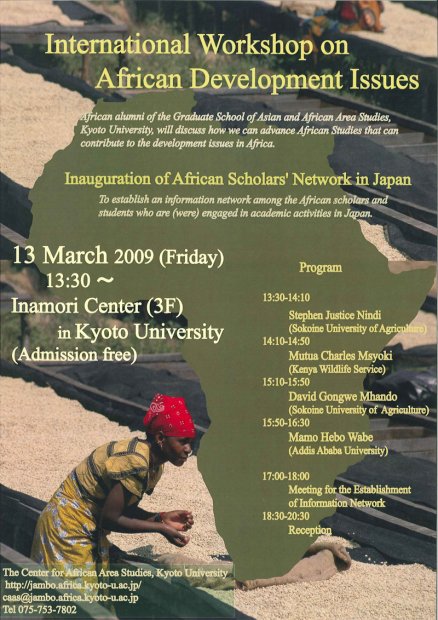
Date: March 13 (Fri) ,2009 13:30-
Venue: Inamori Foundation Memorial Hall, Kyoto University
Inauguration of African Scholars' Network in Japan
"Biosphere as a Global Force of Change"[The Second International Conference]
Date: March 9-11 ,2009
Venue: Room No. 333, Inamori Foundation Memorial Hall, Kyoto University
Registration>>
・The registration has been closed at 12:00, on March 4,2009(Japan Standard Time).
Program / Abstract >>(2009/03/04 UP)
Number of participants: 94
==============================================
Japanese Page>>
../article.php/20080526154811321.html
Program / Abstract >>"Biosphere as a Global Force of Change"[The Second International Conference]
Abstract PDF (20090305UP)![]() >>
>>
| DAY 1 ( March 9th ) | Abstract | ||
| 8:30 - 9:00 |
Registration | ||
| 9:00 - 9:20 |
Welcoming Remarks by Kosuke Mizuno (Director, Center for Southeast Asian Studies (CSEAS), Kyoto University) Opening Remarks Geosphere, Biosphere and Humanosphere: A New Perspective of Modern Global History by Kaoru Sugihara (CSEAS and Convener, G-COE Program, Kyoto University) |
||
| Session 1 : Biospheric parameters in Actions and Norms: Institutional Arrangements and Quantified Expressions. Chair : Kaoru Sughihara (CSEAS and Convener, G-COE Program, Kyoto University) |
|||
| 9:20 - 9:50 |
I-1 | Conflicts and Anarchy in Indian Natural Resources Governance: Need for a Paradigm Shift. by Vishwa Ballabh (XLRI School of Business and Human Resources, Jamshedpur) |
|
| 9:50 - 10:20 |
I-2 | Bridging the Formal-Informal Gap? Changing Institutional Arrangements in Communal Forest by Fumikazu Ubukata (CSEAS, Kyoto University) |
|
| 10:20 - 11:05 |
Comments by Koichi Fujita (CSEAS, Kyoto University) Takeshi Murota (Doshisha University) James E. Nickum (Tokyo Jogakkan College) |
||
| 11:05 - 11:20 |
Coffee Break | ||
| 11:20 - 11:50 |
I-3 | How to Assess the Sustainability of Our Humanosphere? Towards the Development ofHumanosphere Index by Takahiro Sato and Taizo Wada (CSEAS, Kyoto University) |
|
| 11:50 - 12:05 |
Comments by Yasuyuki Kono (CSEAS, Kyoto University) |
||
| 12:05 - 12:45 |
Discussion | ||
| 12:45 - 14:15 |
Lunch | ||
| Session 2 : Geospheric Implication for Biosphere Chair : Masayuki Yanagisawa (CIAS, Kyoto University) |
|||
| 14:15 - 14:35 |
II-1 | Biosphere as a Mediator between Geosphere and Humanosphere by Masayuki Yanagisawa (Center for Integrated Area Studies (CIAS), Kyoto University) |
|
| 14:35 - 14:55 |
II-2 | Interrelationship between Hydrological Cycle and Human Activities by Osamu Kozan (CSEAS, Kyoto University) |
|
| 14:55 - 15:15 |
II-3 | Biodiversity and Ecosystem Function in the Human-made Landscape: Birds Transport Human-Derived Nutrients into Urban Forests by Motoko Fujita (CSEAS, Kyoto University) |
|
| 15:15 - 15:35 |
II-4 | Coping with Natural and Socio-economic Uncertainty in Arid Africa by SUN Xiaogang (CSEAS, Kyoto University) |
|
| 15:35 - 15:50 |
Coffee Break | ||
| 15:50 - 17:15 |
Discussion Chair: Mamoru Kanzaki (Graduate School of Agriculture, Kyoto University) Comments |
||
| 18:00 - 20:00 |
Reception Party (at Shiran Kaikan) | ||
| DAY 2 ( March 10th ) | |||
| Session 3 : Biofuel as a Global Force of Change Session statement>> |
|||
| Poster Session Chair : Rumi Kaida (Research Institute for Sustainable Humanosphere (RISH), Kyoto University) |
|||
| 9:00 - 9:30 |
P1 -15 |
Poster Presentation (2 minutes for each person) See "Poster Titles" page for detail |
|
| 9:30 - 10:00 |
P1 -15 |
Poster session (with snack and coffee) | |
| Oral Presentation Chair : Takashi Watanabe (RISH, Kyoto University) |
|||
| 10:00 - 10:40 |
III-1 | Drivers for Sustainable Use of Bioenegy on a Global Scale by Andre Faaij (Copernicus Institute, Utrecht University) |
|
| 10:40 - 11:10 |
III-2 | R&D on Bio-Fuel Production and Asian Biomass Strategy by Kinya Sakanishi (Biomass Technology Research Center, AIST) |
|
| Discussion Chair : Takahisa Hayashi (RISH, Kyoto University) |
|||
| 11:10 - 12:10 |
Comments by Retno Kusumaningtyas (RISH, Kyoto University) Toshiaki Umezawa (RISH, Kyoto University) Rumi Kaida (RISH, Kyoto University) |
||
| 12:10 - 13:40 |
P1- 15 |
Lunch Poster Session (with snack and coffee) |
|
| 14:00 - 18:00 |
Excursion (Kyoto city sightseeing; Invited participants only) |
||
| DAY 3 ( March 11th ) | |||
| Session 4 : Rehabilitating Biospheric Perspective in the Modern World. Session statement>> Chair : Hiromu Shimizu (CSEAS, Kyoto University) |
|||
| 9:00 - 9:20 |
IV-1 | A Virus, Democracy, and Sustainable Society: The Experience of Community-based HIV/AIDSInitiatives among the Gurage, Southern Ethiopia by Makoto Nishi (CSEAS, Kyoto University) |
|
| 9:20 - 9:40 |
IV-2 | To "Live With" Earthquakes: An Attempt to Build a Better Relationship between theHumanosphere and the Geosphere in Istanbul, Turkey by Shuhei Kimura (CSEAS, Kyoto University) |
|
| 9:40 - 10:00 |
IV-3 | Rice and People; Mechanistic and Organic Visions on Biosphere and Humanosphere by Harro Maat and Edwin Nuijten (Wageningen University,Wageningen University) |
|
| 10:00 - 10:20 |
IV-4 | Political Ecology of Life: Ideas on Humanosphere by Akio Tanabe (Institute for Research in Humanities, Kyoto University) |
|
| 10:20 - 10:35 |
Coffee Break | ||
| 10:35 - 12:10 |
Discussion Comments by Yoko Hayami (CSEAS, Kyoto University) Koji Tanaka (CIAS, Kyoto University) |
||
| 12:10 - 13:40 |
Lunch | ||
| Session 5 : General Discussion | |||
| 13:40 - 16:40 |
Chair : Yasuki Kono & Noboru Ishikawa (CSEAS, Kyoto University) Comments by James E. Nickum (Tokyo Jogakkan College) David Pietz (Washington State University) Hiroki Nogami (IDE-JETRO) Shuichi Kawai (RISH, Kyoto University) Hiromu Shimizu (CSEAS, Kyoto University) |
||
| 16:40 - 17:00 |
Closing Remarks by Noboru Ishikawa (CSEAS, Kyoto University) |
||
| 17:30 - 19:30 |
Advisory Session (Closed Session) |
||
| POSTER TITLES (Poster Session, Session 3, March 10th) |
|||
| 9:00 - 9:02 |
P1 | Evaluartion of Biomass Production of Plantation Forest in Tropical Area; A Case Study of AcaciaPlantation Forest, P.T. Musi Hutan Persada, Indonesia by R. Widyorini, S. Kawai, B. Subiyanto*, E.B. Hardiyanto**, A. Firmanti***, R.Gunawan†, T. Suryanti† and A. Wicaksono† (RISH, Kyoto University; *LIPI,Indonesia; **Gadjah Mada University, Indonesia; ***Research Institute for HumanSettlements, Indonesia; †PT Musi Hutan Persada, Indonesia ) |
|
| 9:02 - 9:04 |
P2 | Estimation of Planted Tree Growth Using Ground-based Observation and Satellite Remote Sensing Data by Shoko Kobayashi, Yoshiharu Omura* and Shuichi Kawai* (CSEAS, KyotoUniversity; *RISH, Kyoto University) |
|
| 9:04 - 9:06 |
P3 | Addressing the Food-Biofuel Dilemma; Using Parasenriathes falcataria as a BioethanolFeedstock in an Integrated Cropping Approach by Retno Kusumaningtyas and Takahisa Hayashi (RISH, Kyoto University) |
|
| 9:06 - 9:08 |
P4 | Loosening Xyloglucan for The Enzymatic Degradation of Cellulose in Wood by Rumi Kaida, Tomomi Kaku, Kei'ichi Baba and Takahisa Hayashi (RISH, KyotoUniversity) |
|
| 9:08 - 9:10 |
P5 | Molecular Breeding of Tropical Acacia by Shiro Suzuki, Md. Mahabubur Rahman*, Takefumi Hattori* and ToshiakiUmezawa* (CSEAS, Kyoto University; *RISH, Kyoto University) |
|
| 9:10 - 9:12 |
P6 | Development of Pretreatment System for Enzymatic Saccharification of Japanese Cedar Wood byWet-Grinding bench plant by Motohito Yoneda, Sadayoshi Kitajima* and Takashi Watanabe (RISH, KyotoUniversity; *Yamani Co. Ltd.) |
|
| 9:12 - 9:14 |
P7 | Technology of Biodiesel Production in China by Jian Liu and Takashi Watanabe (RISH, Kyoto University) |
|
| 9:14 - 9:16 |
P8 | Energy Development in East Karimantan, Indonesia by Yasunori Ohashi, Rudianto Amirta* and Takashi Watanabe (RISH, KyotoUniversity; *Mulawarman University, Indonesia) |
|
| 9:16 - 9:18 |
P9 | Current Status of Biofuels Policy and Their Technological Development in India by Pradeep Verma and Takashi Watanabe (RISH, Kyoto University) |
|
| 9:18 - 9:20 |
P10 | The Role of Remnant Forest in Conserving Bird Diversity in Acacia Plantation in Indonesia by Motoko Fujita, Dewi M. Prawiradilaga* and Tsuyoshi Yoshimura** (CSEAS,Kyoto University; *LIPI, Indonesia; **RISH, Kyoto University ) |
|
| 9:20 - 9:22 |
P11 | Spatial-Temporal Variabilities of Nitrous Oxide Emission from Acacia mangium Soils by Ryota Konda, Seiichi Ohta and Shigehiro Ishizuka* (Graduate School ofAgriculture, Kyoto University; *Forestry and Forest Products Research Institute) |
|
| 9:22 - 9:24 |
P12 | Land Surface Monitoing in The Kyzyl Kumdesert, Central Asia by Osamu Kozan, Naoko Matsuo*, Satoru Oishi** and Kengo Sunada** (CSEAS,Kyoto University; *Mie University; **University of Yamanashi) |
|
| 9:24 - 9:26 |
P13 | Resilience, Vulnerability and Regime Shift: Metamorphoses of A High Biomass Society in Sarawak,Malaysia. by Noboru Ishikawa (CSEAS, Kyoto University) |
|
| 9:26 - 9:28 |
P14 | Protecting Forest, Empowering Communities: Development of Community Forestry Policy inDecentralizing Indonesia by Motoko Shimagami, Motoko Fujita*, Keron Petrus** and Koji Tanaka (CIAS,Kyoto University; *CSEAS, Kyoto University; **University of Indonesia) |
|
| 9:28 - 9:30 |
P15 | Recent Collaboratives Researches for Developing Earthquake Resisting Wooden ResidentialHouses with Tropical Fast Growing Timbers by Kohei Komatsu, Maryoko Hadi* and Bambang Subiyanto** (RISH, KyotoUniversity; *Research Institute for Human Settlement, Indonesia; **LIPI, Indonesia) |
|
"New Paradigm for Human Beings and Nature: Frontier of Asian Area Studies"[The Workshop by the Invited Young Scholars from Asian Countries]
Date: March 3-4 ,2009
Venue: Inamori Foundation Memorial Hall, Kyoto University
Title: New Paradigm for Human Beings and Nature: Frontier of Asian Area Studies”
Tentative Schedule>>![]() (2009/01/27Update)
(2009/01/27Update)
This work shop will be based on "Mutual Exchange of Young Scholars in Integrated Area Studies by Using the Field Station" organized by Center for Southeast Asian Studies and the Keiji Field Stations, Kyoto University.
This workshop is a part of the program “Mutual Exchange of Young Scholars in Integrated Area Studies by Using Field Stations” funded by JSPS, and jointly organized with the G-COE program as the “Junior Scholar’s Research and Training” project. The workshop was held on 3-4 March with 14 invited discussants from the field stations in Laos, Cambodia, Myanmar, Indonesia, and India.
The academic backgrounds of participants included political science, cultural anthropology, forestry, agriculture, and we discussed topics from each field in order to try to demonstrate future possibilities for inter-disciplinary area studies. After this program was finished, we published the results of the workshop as proceedings under the same title from the Center for Southeast Asian Studies, Kyoto University.
(Tatsuki Kataoka)
"Popular Culture Co-productions and Collaborations in East and Southeast Asia"
Date: February 23 Mon.-24 Tue.,2009
Venue: Clock Tower Centennial Hall, Kyoto University → Inamori Foundation Memorial Hall
Co-hosting Organizers
・Japan Society for the Promotion of Science (JSPS), Core University Program
"Forest Policies for a Sustainable Humanosphere"
Date: February 17 Tue.−18 Wed., 2009
Venue: Inamori Foundation Memorial Hall
Co-organization
・Wageningen University and Research Center, Forest and Nature Conservation Policy Group
・University of Goettingen, Institute for Forest Policy, Forest History and Nature Conservation
【Summary】
Policy is a key element that mediates the relationship between human societies and the environment, and policy formulation is for that reason very much debated among academics and practitioners. Policies need constantly to be adapted according to changing societal environmental needs, or to changing environmental capacities to deliver goods and services. These general principles apply equally to forest policies, giving the important role of forest in many societies around the world.
Policy theory development has advanced significantly since the 1990s, but is until today largely based on political life of western societies and mainstream policy domains. This suggests that policy theory development reflects a bias of particular policy cultures. Little explicit use has been made of policy or other political science theories in explaining or guiding forest policy in tropical regions, while the latter is of major importance for economic progress, poverty alleviation, and climate change in many countries. This raises the question if forest policy making can or should be enriched with existing policy theories, or if forest policy making could contribute to policy theory development and testing?
For that reason, we propose to hold an international meeting to address the two following questions:
1. What are the general features of tropical forest policies for the coming years or decades, considering the changing demands of human society on forests, and the changing forest capabilities to provide for those demands?
2. How can policy and political science theories contribute to a better understanding of and thus improve the process of forest policy making?
The meeting will include participants from Japan, representatives from Asia and Africa and scientists from five European Universities (Goettingen, Wageningen, Uppsala, Freiburg, and Dresden). The first day will focus on the general features of forest policies that can address the changing societal demands on forests in a 21st century world. The second day will be dedicated to a discussion how a better theoretical underpinning can improve forest policy making.
"Labour-intensive Industrialisation in South and Southeast Asia"[Joint Workshop]
Date: December 20-21,2008 10:00 - 17:00
Venue: Inamori Foundation Memorial Hall
"GIS-IDEAS 2008,PNC,ECAI Joint International Symposium"
Date: December 4 Thu.-6 Sat.,2008
Venue: Hanoi, Vietnam, La Thanh Guest House
Co-organization
・Japan-Vietnam Geoinformatics Consortium(JVGC)
・Hanoi University of Mining and Geology (HUMG)
・Pacific Neighborhood Consortium(PNC)
・Electronic Cultural Atlas Initiative (ECAI)
【趣旨】 GIS-IDEAS(International Symposium on Geo-informatics for Spatial-Infrastructure Development in Earth and Allied Sciences)国際会議は2年毎に開催され,今年度で4回目を迎える.これまで東南アジアの都市地域における水文及び管理問題,都市開発・工業発展,空間情報技術の革新,地域情報学を主な内容として開催してきた.今年度は,太平洋隣国協会(PNC;Pacific Neighborhood Consortium)と電子地理情報プロジェクト(ECAI;Electronic Cultural Atlas Initiative)を加えた合同国際シンポジウムとして開催する.「Towards Sustainable and Creative Humanosphere」をテーマとし,アジア地域を中心とした生存基盤の構築やあり方と空間情報学の応用について議論する予定である.プログラムセッションとしては,「Geonformatics for Sustainable Use and Management of Natural Resources」,「Area Informatics and Applications」,「Geoinformatics for Health」,「Open Source Geoinformatics」,「Open Standards for Spatial Data Infrastructure」などが現在予定されている.
The FORTROP II Conference "Tropical Forestry Change in a Changing World"
Date: November 17 (mon) - 20(Thu)
Venue: Kasetsart University Bangkok, Thailand
FORTROP II is being organized not only to commemorate the 72nd anniversary of forestry education in Thailand but also to motivate exchanges of technology and experience in various aspects of tropical forestry among stakeholders, researchers, technicians, and involved professionals.
"Fourth Afrasian International Symposium:The Question of Poverty and Development in Coflict and Conflict Resolution"
Venue:3F Seiwa-kan Hall, Omiya Campus, Ryukoku University, Kyoto
Programme>>
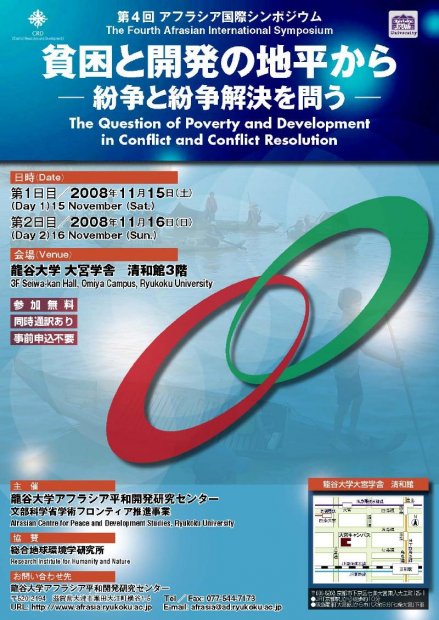 |
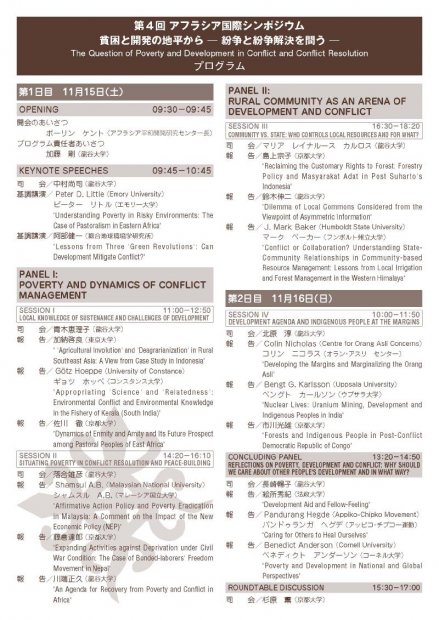 |
| Left / Right |
"Multiple Paths of Economic Development in Global History"[International Conference]
Date: November 8th(Sat)-9th (Sun), 2008
Venue: Room 333, in the 3rd floor, Inamori Memorial Hall
(Change of Venue) Map>>
"Sulawesi Area Studies"[The International Symposium]
Date: October 11 (Sat), 2008
Venue: Gedung PKP 3rd Floor, Hasanuddin University
Co-Organizers:Hasanuddin University/ Global COE Program ”In Search of Sustainable Humanosphere in Asia and Africa/ ” ITP Program “On-Site Education of Practical Languages for Area Studies”
"Preserving local knowledge in the Horn of Africa"
Date: September 17 Wed.-18 Thu.,2008
Venue: Harari Cultural Center Hall (Harar, Ethiopia)
Title: Preserving local knowledge in the Horn of Africa: Challenges and prospects for
collaborative research in oral literature, music and ritual practices
Workshop organized by:
African Local Knowledge Research Group,
jointly with Global COE of Kyoto University
Co-hosting Organizers:
・Harari People National Regional State’s Culture Tourism and Information Bureau
・The Department of Sociology and Social Anthropology (SoSA), Addis Ababa University
・Institute of Ethiopian Studies (IES), Addis Ababa University
In this workshop, international scholars were invited to spend two days in Harar, together with Ethiopian scholars and representatives of local institutions, to present research experiences and reflections on the challenges and prospects for documentation and preservation of local knowledge in the Horn of Africa, with special attention given to the domain of intangible heritage.
The aim was that of promoting interdisciplinary research in oral literature, music and ritual practices, encouraging collaborative work among international scholars, local researchers and communities.
Schedule:
| DATE (Sept. 2008) | |
| Tuesday 16 | Visit of the old city of Harar |
| Wednesday 17 | Workshop opening (afternoon) |
| Thursday 18 | Workshop (morning and afternoon) |
| Friday 19 | Study-tour to the Argobba village Koromi and to Abdulqadir al-Jilani shrine |
| Saturday 20 | Study-tour (arrival in the evening in Addis Ababa) |
"Islam for Social Justice and Sustainability: New Perspective on Islamism and Pluralism in Indonesia"
Date: September 16 Tue.-17 Wed., 2008
Venue: Kyodai Kaikan, Room 101
Co-hosting Organizers:
・Center for Southeasst Asian Studies, Kyoto University
・Center for Asia-Pacific Area Studies, Academic Sinica, Taiwan
・Center for Islamic Area Studies at Kyoto University
・Global COE Program "In Search of Sustainable Humanosphere in Asia and Africa"




【Summary】
This symposium aims to evaluate Islamic thinking and movement in Indonesia from a historical perspective. Indonesia, which has the world’s largest Muslim population, is now in the process of sweeping democratization and decentralization and we witness a myriad of serious debates over the nature of Islamic thinking and movement under these new settings. It is thus an urgent task for us to try to understand these debates and the social and political struggles they represent so that we may be able to discern the different possible pathways to political stability and social justice.
Since 1980s, two currents of thoughts have influenced Indonesian political and economic discussions: neo-liberalism and Islamism. Neo-liberalism has been aggressively pursued by the United States government, the the World Bank (WB) and the International Monetary Fund (IMF), which argue that the privatization of major sectors of the eoconomy and the decentralization of national authority would bring about the most “suitable” regime a developing country like Indonesia will need to attain full development. The Indonesian government took this advise to heart, but, soon after experienced its deadly consequences during the Asian economic of 1997, which, among other things, led to the downfall of the Suharto regime.
Running parallel to the spread of neo-liberal thinking was a deepening commitment to Islam among Indonesian Muslims, many of whom were inspired by the successes of the Iranian revolution. Islamization became one of the most significant changes in Indonesia, and with the political rise of many newly-etablished Islamic political parties, the government’s growing recognition of Islamic laws as part of the laws of the land (the typical example of which is the legalization of Islamic law in Aceh province),, and the suicide bombings in Bali, it has attracted the attention of scholars, policy analysts, military experts, public intellectuals and even NGO activist.
Yet, Indonesian Muslim have also been not treated their religion as a monolith. Indonesian Islamism can, in fact, be divided into two streams. The first is political Islamism that sees no separation between the religion and politics and some of the radicals even advocate the creation of an Islamic state; while the second regards religion as being distinct from politics, vehemently opposes the politicization of Islam, and supports a pluralistic Indonesia. It remains to be seen which current will eventually become dominant Indonesian Islamic thinking, but one thing for sure, the debates that had been sparked by these two currents will definitely play a role in shaping the future of the Indonesian social and political terrain.
It is in the context of these dramatic transformations in Indonesian political thinking that the Center for Southeast Asian Studies and Center for Islamic Area Studies at Kyoto University have decided to co-sponsor an international symposium on “Islam for Social Justice and Sustainability: New Perspective on Islamism and Pluralism in Indonesia” with the Center for Asia-Pacific Studies at Academia Sinica in Taiwan. We have invited former Indonesian President Abdurrachman Wahid to keynote the gathering and his reflections will be commented by Prof. Kosugi Yasushi, a Japanese leading expert on Islam (Kyoto University) and Prof. Michael Hsiao, the director of CAPAS from Taiwan.
The keynote speech will be followed by five sessions on Islamism and Pluralism; Islam in Historical Perspective – Views from the Banten Area; The Three Isms in Indonesian Islam: Pluralism, Islamism and Radicalism; Islam from a Long Historical Perspective; and Islam and Public Health in Comparative Perspective.
"Pastoral Societies in Africa: New Possibilities for Sustainable Development through the Interaction of Scientific Researchers and Development Workers"
Date: September 4,(Thu) 2008
Venue: University of Nairobi, Kenya
Pastoral Societies in Africa:
New Possibilities for Sustainable Development through the Interaction of Scientific Researchers and Development Workers
Co-hosting Organizers:
・Institute of African Studies, University of Nairobi
・Japan Society for the Promotion of Science (JSPS), Nairobi Research Station
・Center for African Area Studies, Kyoto University




【Summary】
The Nairobi Research Station of the Japan Society for the Promotion of Science (JSPS), the Institute of African Studies of Nairobi University, and the Center for African Area Studies of Kyoto University will hold an international workshop in Nairobi, the capital of Kenya, in September 2008. The workshop will address new possibilities for the sustainable development of African pastoral societies by promoting communication, discussion, and cooperation among researchers and development workers from both Japan and worldwide who have worked among pastoral societies in Africa.
African pastoralists experienced sweeping natural and socioeconomic changes in the 20th century. The increasing frequency of drought, loss of access to natural resources, politico-economic marginalization in both the colonial era and post independence, ethnic conflicts and insecurity, and large-scale international and national development projects have all had a heavy impact on pastoralists. However, with the expansion of globalization, communications technology, and increasing interaction between pastoralists and development agencies, more pastoralists are beginning to understand their situation in a larger context and to communicate their problems and views to national governments and development agencies. Among the problems for pastoralist societies are poverty, economic discrimination, insecurity, and a lack of access to political decision making, education, and public services.
In conjunction with these trends, the United Nations Office for the Coordination of Humanitarian Affairs and the African Union Inter-African Bureau for Animal Resources and Department of Rural Economy and Agriculture launched the "Pastoral Policy Framework Initiative" in 2007. This initiative aims to produce tangible results supporting sustainable economic development of pastoral communities. International conferences were held at Isiolo in July 2007 and Nairobi in April 2008.
Japanese researchers have ascertained the subsistence fundamentals of African pastoral societies, which include access to and distribution of ecological and sociological resources, livelihood strategies maintained by indigenous knowledge and local practices, resource use and management conventions, socioeconomic systems centered on reciprocal help activities, and a flexible attitude toward disasters. Cultural and social researchers have examined disease coping mechanisms and the noble representations of pastoralists about their own cultures. In all, this research suggests that development projects tend to fail because of shortsighted and biased development initiatives that fail to understand that pastoralists adapt flexibly to the natural environment; instead, these projects concentrate solely on economic and technical aspects, without considering the socio-cultural values and practices of pastoral societies.
The September workshop will focus on local practices, as recorded over many years of anthropological fieldwork, and will be consultative and highly participatory between researchers and development affairs professionals. The objective is to address critical issues facing pastoral communities and determine workable solutions that can shape sustainable development. The ultimate goal is to move toward more holistic and effective development policies, based on local practices, for African pastoralism.
Presentations:
(1) Itaru Ohta(Professor, ASAFAS, Kyoto University)
(2) Itsuhiro Hazama(Resident Director, Japan Society for the Promotion of Science, Nairobi Research Station)
(3) SUN Xiaogang(G-COE Researcher, CSEAS, Kyoto University)
(4) Ali Wario (UN-OCHA, African Pastoral Policy Framework Specialist)
(5) Kennedy Agade Mkutu (Lectures, Kenya Institute for Administration)
(6) Dr. Zeremariam Fre (Senior Lecturer, University College London)
Commentators:
(1) Isaac Nyamongo (Director of Institute of African Studies, University of Nairobi)
(2) Shinya Konaka (Associate Professor, University of Shizuoka)
"Ecosystem function and conservation of tropical forests"[Workshop]
Date: August 12 Tue.-13 Wed.,2008
Venue: Boarding roon, Center for Global Environmental Research (CGER),
National Institute for Environmental Studies, Tsukuba, Japan
Co-hosting Organizers :
・National Institute for Environmental Studies,
The Center for Global Environmental Research (CGER)
・Forestry and Forest Products Research Institute
・Hiroshima University
・In Search of Sustainable Humanosphere in Asia and Africa
【Record of Activity】
The workshop consisted of three sessions subjects of which were ‘carbon stocks and change’, ‘biodiversity, forest structure’, ‘landuse change and management, local community’ and ‘database and institutional networking’. First, roles of tropical rain forest in climate change were discussed based on continuous monitoring of CO2 exchange between forest and the atmosphere in Peninsula Malaysia. The three-year monitoring result demonstrated that tropical rain forest was not a strong carbon sink, but delicate balance of photosynthesis and ecosystem respiration in dry and rainy seasons influences the uptake and emission of CO2. Studies presented in the workshop including CO2 exchange were mainly conducted in Pasoh Forest Reserve in Negeri Sembilan in Malaysia. Shuhaimi Mohd. Yusof of Forest Department of Negeri Sembilan introduced the outline of forest sector there. The presentation focused on the role of the department in controlling the sustainable forest management., and emphasized the important role in applying the Malaysian Criteria and Indicator for Forest Management Certification (MC & I). Because forest management in consideration of the carbon balance is strongly needed in tropical regions, the workshop confirmed the necessities continuous studies should be conducted in Pasoh Forest Reserve.
(Makoto Tani)
"Re-conceptualization of Wildlife Conservation -Toward Resonatable Actions for Conservation-"
Date: August 7 Thu, 2008
Venue: Multipurpose Hall, Japanese Embassy in Nairobi, Kenya
Co-hosting Organizers:
・Kenya Wildlife Services (KWS)
・Kyoto University (GCOE)
・JSPS (Nairobi Research Station)
・University of Tokyo (Graduate School of Agricultural and Life Sciences)
・Waseda University (Hirayama Ikuo Volunteer Center)
・Fukushima University




【Program】
9:00-9:10
Opening Remarks (I. Hazama)
9:10-12:10
Session 1: Wildlife Conservation in Current Kenya (T. Meguro, M. Okello, M. Ogada and C. Musyoki, )
13:00-15:40
Session 2: Various Perspectives of Wildlife Conservation (Y. Yamane, A. Yasuda, N. Nishizaki, Y. Iwai)
16:00-17:20
Session 3: General Discussion (I. Hazama, D. Western)
17:20- 17:30
Closing Remakes (C. Musyoki)
In total there were 64 participants. Their affiliations included the Kenya Wildlife Service, the African Conservation Centre, the East African Wild Life Society, Kenyatta University, JICA and so on. The intention of this workshop was to consider the meaning of “conservation” with those who are interested in or working within that issue in Kenya. We prepared discussion times for session 1 and 2, and a general discussion as session 3 for more than one hour. During this time, there were many questions and comments, and the following topics were discussed amongst participants; how local people can keep their rights or opinion against outside investors who have strong economic power, is it adequate to call various animals just “wildlife” as a whole ignoring their difference in local context, how local people can be empowered and by who and how such empowerment should be practiced, etc.
(Toshio Meguro)
"Chinese Identities and Inter-Ethnic Coexistence and Cooperation in Southeast Asia"
Date: July 4(Fri) - 5(Sat),2008
Venue: Room No. 207 on the 2nd floor of East building
Co-organizer:
Netherlands Institute for War Documentation,
with Dr. Nobuhiro Aizawa of the Institute of Developing Economies as chief liaison
【Summary】
This workshop aims to historicize the lived experience of "being Chinese" in Southeast Asia by looking at how economic, political, cultural, and ideational processes have contributed to defining, producing, and reworking "Chineseness" in various colonial and national arenas in Southeast Asia over time. "Chinese" everyday life, ascription, and self-identification in Southeast Asia have been shapedby transnational migration, by colonial and national states and their projects of modernity, by global capitalism, and by discourses of "Chineseness." The historically problematic status of the Chinese-- variously defined as economically dominant, political subversive, and culturally different--has been a source of ethnic tensions, principally expressed through economic nationalism, political disenfranchisement, assimilation-integration debates and campaigns, and (as in the case of Indonesia) riots and outright violence. Yet "Chinese" identities have been far more complex, multiple, and protean than is presupposed by either scholarship or public policy or popular imagination. With the rise of China and East Asian (both Northeast Asia and Southeast Asia) regional growth and integration, "Chineseness" has been reconfigured in line with changes in state policy, the popularity and impact of "overseas Chinese" studies, and the vicissitudes of globalization. Our aim is to highlight, through a focus on Indonesian Chinese in comparative regional perspective, the ongoing reworkings and negotiations of "Chineseness" and the challenges they pose for inter-ethnic coexistence and cooperation in Southeast Asia.
【Program】
DAY 1:July 4 (Friday)
13:00-13:15: Opening Remarks
Professor Kosuke Mizuno, Director, CSEAS
13:30-15:30
Session I: Networks and Localities
Peter Post, (Netherlands Institute for War Documentation) Peranakan
Elite Family Networks and Southeast Asia's Indigenous Royalty: Status,
Modernity, and Identity
Tatsuki Kataoka (ASAFAS), The Baba Culture in Thailand
15:45-17:45
Session II: Claiming Citizenship
Elizabeth Chandra (Keio), The New Indigenes: Chinese-Indonesians and the
2006 Citizenship Law
Caroline Hau (CSEAS), Blood, Land, and Conversion: The Politics of
Belonging in Jose Angliongto’s The Sultanate
DAY 2:July 5 (Saturday)
10:00-12:00
Session III: State and Chinese
Ay Mey Lie (Amsterdam), Ethnic Chinese in the Indonesian Armed Forces:
Identification and Participation in Historical Perspective
Nobuhiro Aizawa (IDE-JETRO), Delivering Citizenship: DEPDAGRI and the
Chinese in the 1980s
13:00-15:00
Session IV: Limits of Representation
Nobuto Yamamoto (Keio), Clandestine Words: Persbreidelordinnantie in the
1930s Indies
Junko Koizumi (CSEAS), Beyond the Assimilation-Sinicization Framework:
Studies of the Chinese Society in Thailand Reconsidered from Historical
and Local Perspectives
15:15- 17:15
Session V: Interrogating Identities
Yumi Kitamura (CSEAS), Reconstructing Indonesian-Chinese Cultural
Identity in Post-Suharto Indonesia
Thung Ju Lan (Lembaga Ilmu Pengetahuan Indonesia, CSEAS Visiting
Research Fellow), The Search for Chinese Identity and Culture among
Chinese Indonesians during the Post –Suharto Era
Funding for the workshop was provided by CSEAS and the G-COE Program
"Los países andinos en la era posneoliberal"[Conferencia]
Date: June 14(Sat) -15(Sun),2008 9:00-
Venue: International Conference Hall II, Clock Tower Centennial Hall 2F, Kyoto University
Conferencia “Los países andinos en la era posneoliberal: estudio comparado de la dinámica del cambio social”
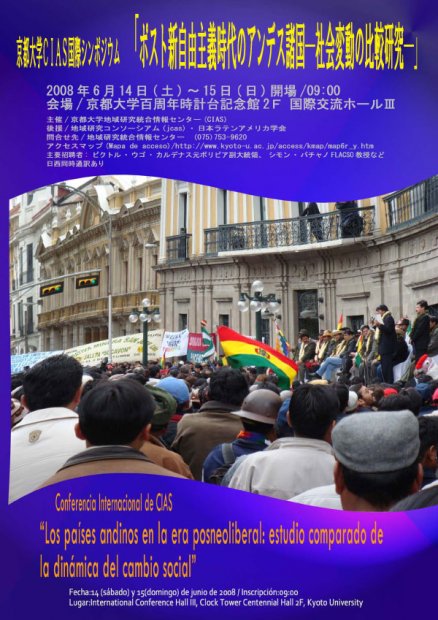
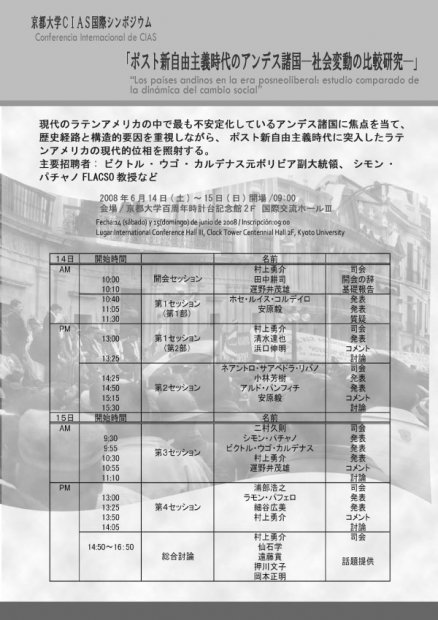
Objetivos
Alrededor del año 1980 las ondas de “democratización” y reforma neoliberal llegaron a la orilla de América Latina; sin embargo, en los siguientes años alcanzaron a casi toda la región. De diversas áreas del mundo en desarrollo, América Latina ha sido la primera en experimentar ambos cambios casi simultáneamente. Luego de dos décadas, a fines de 1990, la sociedad latinoamericana ha entrado en una nueva etapa de transición.
La “democratización” y la introducción de la economía de mercado —impulsadas desde fines de la década de 1970— han causado cierto nivel de estabilidad y desarrollo. Atrás quedó la economía caótica con hiperinflación, lo cual ha creado un ambiente que ha permitido el desarrollo macroeconómico y la integración regional. Por otro lado, se ha mantenido la democracia como marco básico de la política, excepto algunos casos. Bajo este sistema político han surgido fuerzas populares que anteriormente fueron impedidas de participar o estaban inactivas políticamente; y se ha reconocido la diversidad étnico-cultural.
Sin embargo, como lado negativo, han empeorado y se han puesto de relieve los problemas estructurales mantenidos desde la independencia de comienzos del siglo diecinueve, particularmente la pobreza y la disparidad indiscutiblemente presentes en los aspectos de estratos sociales, etnicidad y regiones en el interior de un país. La construcción del Estado y la formación de naciones han sido nuevamente propuestas como desafíos de la sociedad latinoamericana.
Además, mientras el Estado tradicionalmente débil no ha aumentado o disminuido el nivel de su capacidad de gestión, las organizaciones intermediarias como partidos políticos, sindicatos y movimientos sociales se han visto obligados a transformarse o reorganizarse; los lazos sociales se han aflojado y los conflictos sociales se han intensificado. Todo ello ha conducido a la desestabilización del marco político democrático. La situación ha empeorado más debido tanto al problema de narcotráfico como a la expansión de la corrupción y la delincuencia.
En pocas palabras, se ha planteado como punto más importante el desafío de la construcción de la gobernabilidad democrática.
Por su parte, el empeoramiento socioeconómico ha inducido a los países latinoamericanos a revisar la línea neoliberal que impulsó la reforma económica. En diversos países, los que apoyan la revisión de las políticas económicas constituyen la mayoría de la sociedad política. De este modo, América Latina ya se encuentra en la etapa posneoliberal. Esta realidad se manifiesta nítidamente en el hecho de que cada vez en más países la “izquierda” ha logrado subir al poder desde fines de la década de 1990.
En los cinco países andinos —Bolivia, Colombia, Ecuador, Perú y Venezuela—, los mencionados problemas de América Latina en general se han presentado simbólicamente con mayor intensidad y profundidad. La región andina ha sufrido una inestabilidad aguda en los últimos años. Los partidos políticos existentes han perdido el poder e influencia que antes tuvieron, ahora están relegados a segundo plano o reemplazados por las fuerzas nuevas. En más de un país, diversos presidentes elegidos por voto popular han sido destituidos o se vieron obligados a renunciar al cargo antes de terminar su mandato. La mayoría de casos de la “izquierda equivocada” —términos acuñados por Jorge G. Castañeda— de América Latina se encuentra en la región andina, y su presencia en el poder ha provocado un intenso enfrentamiento político en el interior. Por su parte, las actividades de los grupos armados antigubernamentales y la expansión del tráfico de drogas han producido múltiples efectos negativos en algunos países.
Esta conferencia enfoca la dinámica de los países andinos, los más inestables en la América Latina contemporánea, para analizar su estado actual en la era posneoliberal. Sin perder de vista la perspectiva de la trayectoria histórica y factores estructurales, los académicos elucidarán la situación actual de la economía y política inestables, sus caracteres, causas y posibles escenarios de evolución en el futuro. Concretamente, en relación con la economía, los ponentes tocarán la persistencia de la estructura económica débil dependiente de la exportación de los productos primarios, y buscarán las condiciones e instituciones para el desarrollo sostenido. Respecto de la política, los estudiosos analizarán las causas y la situación de inestabilidad de la democracia, y discutirán tanto las bases para su consolidación como proyecciones futuras sobre la base del análisis de la situación actual de cambio y las fuerzas políticas emergentes, incluidas las indígenas. En la parte final de la conferencia, los participantes realizarán la comparación de la dinámica observada en los casos latinoamericanos con las tendencias de otras partes del mundo, y reflexionarán sobre la universalidad y especificidad de la situación latinoamericana."Towards sustainable land-use in tropical Asia"[Initiative 2 Seminar]
Date:April 23-26, 2008
Venue: Hilton Hotel, Kuching, Sarawak, Malaysia
"In Search of Sustainable Humanosphere in Asia and Africa: The First International Conference"
Date:March 12-14,2008
Venue:Kyodai Kaikan 101 Room (http://www.kyodaikaikan.jp/) , map>>
Registration >>
Thank you vey much for your registration. Unfortunately the registration has been closed now. With regard to International Conference, please come to Kyodai Kaikan directly in 12 March, 2008. The registration will start from 9:30 AM.
Mission Statement
The Global COE Program will hold the first Kyoto international conference on sustainable humanosphere from the 12th to the 14th of March at Kyoto University.
The conference is designed to summarize the academic progress of our Program since its inception last July, and to engage in discussion with invited scholars from various disciplines, to take stock of current state of our knowledge and identify avenues for further research.
So far we have concentrated our efforts on setting up the organizational structure, appointing researchers, distributing research grants, and holding seminars and conferences at home and abroad. By April we will have appointed nine G-COE assistant professors and postdoctoral researchers, and will have held seven international workshops, including those in Indonesia, Thailand, Ethiopia and the U.K., and more than forty seminars at home.
Emerging is a sense of an intellectual community which shares the purpose and vocabulary: in particular, we have been discussing the issue of how to combine humanosphere science research with a broader interest in institutions, politics, economics, history and culture in the context of area studies. Global environmental issues are important part of this, but we are developing a specifically area studies based perspective, by bringing in factors specific to tropics, and by relativizing the prevailing views and discourses, which are often formulated on the historical experiences of the "developed world" in the temperate zones. We are implementing a joint research, at a fieldwork site of Indonesia, which is intended to contribute to the development of humanosphere-sustainable technologies and the institutions that accompany them.
In this conference we will invite approximately ten scholars from abroad, to hear their own views and to receive comments on our perspectives. We will also present the initial outcome of our own research and, more importantly, the research agenda, which we intend to undertake during the next four years.
The four main sessions will be organized primarily by conveners of the four research initiatives of the Program. The conference as a whole will be convened by Professor Noboru Ishikawa, chairman of the organizing committee.
Kaoru Sugihara
Convener, Global COE Program
Kyoto University
Downloads: Program ![]() (2008/03/11UP)
(2008/03/11UP)
| Day 1: March 12th | |
| 9:30~10:00 | Registration |
| 10::00~10:10 | Opening Remarks Kosuke Mizuno (Director, Center for Southeast Asian Studies, (CSEAS), Kyoto University) |
| Opening Session: The Humanosphere Project – Where We Stand Chairperson: Yoshiharu Omura (Research Institute for Sustainable Humanosphere, Kyoto University) |
|
| 10:10~10:40 |
“The Humanosphere-sustainable Path of Development: |
| 10:40~11:10 | “Land and Labor Intensive Agricultural Systems in Monsoon Asia: Comparative Perspectives on the Technological Development in Wet-Rice-Based Farming in Early Modern and Modern Periods” Koji Tanaka (Center for Integrated Area Studies (CIAS), Kyoto University) |
| 11:10~12:10 | Discussion including comments by Chris Baker |
| 12:10~13:40 | Lunch |
| Session 1: Geosphere, Biosphere & Humanosphere Chairperson: Naoto Kagotani (Institute for Research in Humanities, Kyoto University) |
|
| 13:40~14:10 | “Energy, Humanity’s Greatest Addiction” Alfred Crosby (The University of Texas at Austin) |
| 14:10~14:40 | “Towards a history of the Humanosphere” David Christian (San Diego University) |
| 14:40~15:10 | “Health Hazards in 19th Century India: Cholera and Malaria Epidemics in Semi-Arid Tropics” Kohei Wakimura (Osaka City University) |
| 15:10~15:25 | Coffee Break |
| 15:25~16:45 | Discussion including comments by: Kozo Matsubayashi (CSEAS, Kyoto University) David A. Sonnenfeld (State University of New York) |
| 18:00~ | Reception (Shiran Kaikan) |
| Day 2: March 13th | |
| Session 2: Forest metabolism - Changing Nature of Biomass in Humanosphere Chairperson: Takahisa Hayashi (RISH, Kyoto University) |
|
| 9:00~9:30 | “Contrasting Stories: Population and Forests, East Asia and Europe, Traditional and Modern” Osamu Saito (Hitotsubashi University) |
| 9:30~10:00 | “Biomass Society in the Tropics: Genesis and Metamorphoses” Noboru Ishikawa (CSEAS, Kyoto University) |
| 10:00~10:30 | “Biosphere Reserve - A Strategic Concept Toward Sustainable Development, Indonesian Case Study” Endang Sukara (Indonesian Institute of Sciences (LIPI)) |
| 10:30~11:00 | “Sustainable Forest Management and Regional Environment in South-East Asia” Shuichi Kawai (RISH, Kyoto University) |
| 11:00~11:15 | Coffee Break |
| 11:15~12:35 | Discussion including comments by: Andrew Walker (Australian National University) Wil A. de Jong (CIAS, Kyoto University) |
| 12:35~14:15 | Lunch |
| Session 3: Environment-inspired Technologies and Institutions in the Tropics Chairperson: Masayuki Yanagisawa (CIAS, Kyoto University) |
|
| 14:15~14:45 | “What role for West Africa’s trees?” Sara Berry (Johns Hopkins University) |
| 14:45~15:15 | “Global Nature Resource Management and Local Socio-Economics Conditions” Andrew Walker (Australian National University) |
| 15:15~15:45 | “What are nature-inspired Technologies and Institutions?” Yasuyuki Kono (CSEAS, Kyoto University) |
| 15:45~16:00 | Coffee Break |
| 16:00~17:20 | Discussion including comments by: Takashi Watanabe (RISH, Kyoto University) Koji Tanaka (CIAS, Kyoto University) |
| Day 3: March 14th | |
| Session 4: Reassembling Knowledges - Asian and African Potentialities towards Sustainable Humanosphere Chairperson: Yoko Hayami (CSEAS, Kyoto University) |
|
| 9:00~9:30 | “Cultural Politics of Life:Vernacular Democracy and Possibilities for Humanosphere-sustainable Development in Contemporary Rural Orissa, India” Akio Tanabe (Institute for Research in Humanities, Kyoto University) |
| 9:30~10:00 | “Indigenous People's knowledge in India: the implications of formal schooling” Nandini Sundar (University of Delhi) |
| 10:00~10:30 | “Local Knowledge for Positive Practice: How ensete (Ensete ventricosum) farmer's varieties are conserved in Ethiopia? ” Masayoshi Shigeta (ASAFAS, Kyoto University) |
| 10:30~11:00 | “Ecological Modernization and Sustainability in the Forestry Sector in Asia” David A. Sonnenfeld (State University of New York) |
| 11:00~11:15 | Coffee Break |
| 11:15~12:35 | Discussion including comments by: Akira Adachi (ASAFAS, Kyoto University) Motoji Matsuda (Graduate School of Letters, Kyoto University) |
| 12:35~14:15 | Lunch |
| Session 5: Where Do We Go from Here? Chairperson: Kaoru Sugihara |
|
| 14:15~14:35 | “Back to the Genuine Humanosphere – The Future Gate We Ought to Open” Yasushi Kosugi (ASAFAS, Kyoto University) |
| 14:35~15:15 | General discussion led by the chair, including short presentations by: Takahiro Sato (GCOE Program, Kyoto University) Tamaki Endo (GCOE Program, Kyoto University) Makoto Nishi (GCOE Program, Kyoto University) |
| 15:15~15:30 | Coffee Break |
| 15:30~16:50 | General discussion including comments Pasuk Phongpaichit (Chulalongkorn University) |
| 16:50~17:00 | Closing Remarks: Noboru Ishikawa(Chairperson, Organizing Committee) |
| Other participants: | |
| Pasuk Phongpaichit Mamoru Yamamoto (RISH, Kyoto Uniersity) Hiroyuki Yano (RISH, Kyoto Uniersity) Koichi Fujita (CSEAS, Kyoto University) Masaaki Okamoto (CSEAS, Kyoto University) Fumikazu Ubukata (GCOE Program, Kyoto University) Shuhei Kimura (GCOE Program, Kyoto University) Osamu Kozan (GCOE Program, Kyoto University) Tamaki Endo (GCOE Program, Kyoto University) Makoto Nishi (GCOE Program, Kyoto University) Takahiro Sato (GCOE Program, Kyoto University) Taizo Wada (GCOE Program, Kyoto University) Sun Xiaogang (GCOE Program, Kyoto University) Motoko Fujita (GCOE Program, Kyoto University) Shoko Kobayashi (GCOE Program, Kyoto University) |
|
"Labour-intensive Industrialisation in Southeast Asia"[Workshop](2008/3/01-02)
Date: March 1(Sat.) ― 2(Sun.), 2008
Venue: Room 207, 2nd floor of East Building, CSEAS
Provisional Programme: See an attached file
Organezers: JSPS-NRCT Core University Program: Project 9 / Global COE
Program: Initiative 1
Day 1
10.30 am – 12 am: Overview and Comments
- Kaoru Sugihara (CSEAS, Kyoto University)
Labour-intensive Industrialisation in Southeast Asia: A Preliminary Comparative Perspective - Pasuk Phongpaichit (Chulalongkorn University.)
Some Thoughts on Labour-intensive Industrialisation in Southeast Asia
Lunch
1 pm – 3.30 pm: Round Table: Back to the State?
- Takashi Shiraishi (GRIPS)
On State Formation - Chris Baker
On the Post-developmental State - Thee Kian Wie (LIPI, Indonesia)
On Policy-makers, Senior Officials and Businessmen
4:00 pm – 6.00 pm: Indonesia
- Thee Kian Wie
Indonesia's Industrialisation during and after the Soeharto Era: Aspects of Labour-intensive Industrialisation - Kosuke Mizuno (CSEAS, Kyoto University)
A Path to Prosperous Rural Industry in Indonesia: Case of Roof-tile Industry
Discussant: Fumiharu Mieno (Kobe University)
7 pm-: Dinner and Informal Discussion at a room at Fujitei (nearby restaurant)
Day 2
10 am – 12 am: Southeast Asia
- Porphant Ouyyanont (Suhhothai Thammathirat Open University, Thailand)
Cheap Labor and the Industrialization of Bangkok after 1945: Some Revision - Tatsufumi Yamagata (IDE-JETRO)
Two Dynamic LDCs: Cambodia and Bangladesh as Garment Exporters
Discussant: Koichi Fujita (CSEAS, Kyoto University)
Lunch
1:pm. – 2.30 pm: Japan
- Masayuki Tanimoto (University of Tokyo)
From Peasant Economy to Urban Agglomeration: The Transformation of ‘Labour-intensive Industrialization’ in Modern Japan - Haruo Wakimura
The Decline of Japanese Cotton-weaving Districts in Postwar Japan
Discussion: Akihiko Ohno (Aoyama Gakuin Universiity)
3 pm – 4.30 pm: India and Comparative
- Takashi Oishi (Kobe City University of Foreign Studies)
Aspects of Labour Intensive Economy around Bicycles in Modern India with Special Focus on the Import from Japan
General discussion
Other participants:
Nobuko Nagasaki (Ryukoku University)
Takeshi Onimaru (GRIPS)
Takahiro Sato (G-COE, CSEAS, Kyoto University)
Naomi Hosoda (CSEAS, Kyoto University)
Shinya Ishizaka (ASAFAS, Kyoto University)
Shinsuke Nagaoka (ASFAS, Kyoto University)
Nao Sato (ASAFAS, Kyoto University)
Kyoko Oga (Osaka Univeristy)
Shiro Sato (Ryukoku Univeristy)
"Resources under Stress"[The Third AFC International Symposium] (2008/2/23-24)
Date:February 23 (Sat.) - 24(Sun.),2008
Venue:3F Seiwa-kan Hall, Omiya Campus, Ryukoku University, Kyoto
Organised by Afrasian Centre for Peace and Development Studies, Ryukoku University
In association with
Global COE Program “In Search of Sustainable Humanosphere in Asia and Africa”, Kyoto University
Resources under Stress: Sustainability of the Local Community in Asia and Africa
| Day 1 (23 Feb.) | |
| 08:30 | Registration |
| 09:10 | Opening Remarks Prof. Nobuko Nagasaki, Director of Afrasian Centre for Peace and Development Studies |
| 09:20 | Welcome Speech Prof. Dohshou Wakahara, President of Ryukoku University |
| 09:25 | Program Chair Address Prof. Yoshio Kawamura, Ryukoku University “Envisioning a Prosperous Rural Future in the Globalizing World” |
| 09:55 | Keynote Speech Prof. Norman Uphoff, Cornell University “Envisioning Post-Modern Agriculture” |
| 10:40-12:30 | Session 1: Conflict over Natural Resources in Asia and Africa Chair: Assoc. Prof. Kosuke Shimizu, Ryukoku University Contributors: Prof. N. Shanmugaratnam, Norwegian University of Life Sciences “Post-War Development and the Land Question in South Sudan” Prof. Kazuo Takahashi, The Open University of Japan “Oil, Blessing or Curse on Iraq?” Discussant: Prof. Shigemochi Hirashima, Graduate School, Nihon-Fukushi University |
| 13:30-15:45 |
Session 2:Resource Management in Comparative Historical Perspective |
| 16:00-18:15 | Session 3: Water Resources under Stress Chair: Prof. N. Shanmugaratnam, Norwegian University of Life Sciences Contributors: Prof. K. Palanisami, Tamil Nadu Agricultural University “Tank Irrigation in South India: Water Shortages and Management Strategies” Prof. Hisashi Nakamura, Ryukoku University “Stored Water Management as an Asian Model of Conflict Resolution” Shinya Ishizaka, Afrasian Centre for Peace and Development Studies “Politics of ‘Sublimation’: The Gandhian Environmental Movement in Contemporary India” |
| Day 2 (24 Feb.) | |
| 09:00 | Registration |
| 09:30-12:00 | Session 4: The Impact of New Technology and System on Local (Food) Resources Chair: Prof. Yoshio Kawamura, Ryukoku University Contributors: Prof. Lawrence Busch, Michigan State University “New Technologies, Standards, and Local Food Resources” Assoc. Prof. Lily Kiminami, Niigata University “New Technology, Local Resources and Industrial Cluster” Assoc. Prof. Masashi Tachikawa, Ibaragi University “Unproven Promise?: Agricultural Biotechnology for Local Food Resources” Discussant: Prof. Atsushi Kitahara, Ryukoku University |
| 13:30-16:00 | Session 5: The Oil-based Economy under Strain Chair: Prof. Hajime Kose, Ryukoku University Contributors: Prof. Kaoru Sugihara, Kyoto University “East Asia, Middle East and the World Economy: The Oil Triangle under Strain” Dr. Thee Kian Wie, The Indonesian Institute of Sciences (LIPI) “The Impact of the Two Oil Booms of the 1970s on the Indonesian Economy” Assoc. Prof. Tomoya Suzuki, Ryukoku University “Decision to Substitute from Gasoline to Alternative Fuels: Within a Framework of Real Option Models” Discussant: Prof. W. D. Lakshman, University of Colombo |
| 16:00-17:00 | Wrapping-up Session Chair: Prof. Pauline Kent, Ryukoku Univeristy Contributors: Prof. Hisashi Nakamura, Ryukoku University Prof. Yoshio Kawamura, Ryukoku University Prof. Atsushi Kitahara, Ryukoku University |
| 17:00 | Closing Remarks Prof. Pauline Kent, Ryukoku Univeristy |
"Humanospheric Science School 2008"
Date: February 21 Thu.-23 Sat,2008
Venue: Indonesia
Co-hosting Organizers:
Indonesian institute of Sciences
"Local Knowledge and Its Positive Practice"[International Workshop](2008/02/14-15)
Date:February 14(Thu.)-15(Fri.) ,2008
Venue:Ras Amba Hotel Conference Room
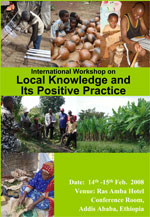 |
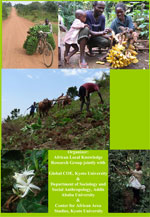 |
| Left / Right |
| 1st Day (14th, Feb.) | |
| Opening Session | |
| 10:30-10:50 | Gebre Yntiso Opening Speech |
| 10:50-11:20 | Masayoshi Shigeta Introductory Remarks: “Formation of African Local Knowledge and Positive Practice: An Area Studies Approach” |
| 11:20-11:50 | Yoko Hayami “Seeds and Taboos: Cultural Reproduction and Domestic Networks among Karen in Bago Mountains, Burma” |
| 12:00-13:15 | Lunch Break at Ras Amba Hotel |
| Session 1: Craft Works and Livelihood [COORDINATOR: Morie Kaneko] | |
| 13:15-13:45 | Getaneh Mehari “Weaving, Migration and Livelihood Patterns among the Dorze” |
| 13:45-14:15 | Morie Kaneko “Pottery Making as Local Knowledge: The Case of Open Firing Practice among the Ari Potters in Southwestern Ethiopia” |
| 14:15-14:30 | Commentator: Mamo Hebo |
| 14:30-14:45 | Break |
| Session2: Diversity and Plant Utilization in African Homegardens [COORDINATOR: Yasuaki Sato] |
|
| 14:45-15:15 | Tesfaye Abebe “Plant Species and Use Diversity of Enset-Coffee Homegardens in Southern Ethiopia” |
| 15:15-15:45 | Deborah Karamura “Analysis of Banana Based Homegardens Management Practices: A Farmer's Perspective towards Maintaining Diversity on Farm” |
| 15:45-16:15 | Yasuaki Sato “The Multi-valued Setting of Banana-based Homegardens among the Baganda, Central Uganda” |
| 16:15-16:45 | Satoshi Maruo “The Developent Process of Banana-based Homegarden: A Case Study of the Haya, Northwestern Tanzania” |
| 16:45-17:00 | Commentator: Zemede Asfaw |
| 18:00-20:00 | Reception at Ras Amba Hotel |
| 2nd Day (15th, Feb.) | |
| Session 3: “Traditional” Healing Practices [COORDINATOR: Mamo Hebo] |
|
| 10:00-10:30 | Mamo Hebo “Healing Through the Mediation of the Spirits: The Case of Jaarii among the Arsii Oromo of Kokossa District” |
| 10:30-11:00 | Setarge Kenaw “Knowledge Production in Zar: A Study in the Dynamism of Healing Practices” |
| 11:00-11:15 | Commentator: Asseffa Torella |
| 11:15-12:30 | Lunch Break at Ras Amba Hotel |
| Session 4: Forest Coffee Production and Environmental Management [COORDINATOR: Yoshimasa Ito] |
|
| 12:30-13:00 | Endashaw Bekele “Origin of Coffea arabica and the Significance of Its Conservation on Human Culture.” |
| 13:00-13:30 | Yoshimasa Ito “Human Influence on the Forest of Coffee” |
| 13:30-14:00 | Getachew Berhan “Importance of Wild Coffee in Forest Genetic Resources Conservation in Ethiopia” |
| 14:00-14:15 | Break |
| Session 5: Development, Resource, and Indigenous Social Organizations [COORDINATOR: Makoto Nishi] |
|
| 14:15-14:45 | Getachew Godana “The Potentials of Indigenous Knowledge for the Conservation of Natural Resources: The Case of Nach Sar National Park (NNP)” |
| 14:45-15:15 | Makoto Nishi “Community-based Rural Development and the Politics of Redistribution: The Experience of the Gurage People’s Self-help Development Organization” |
| 15:15-15:30 | Commentator: Endashaw Bekele |
| 15:30-15:45 | Takeshi Matsui “Closing Remarks” |
| 15:45-15:55 | Bekele Gutema “Closing Remarks” |
| 18:00-20:00 | Reception at Top View |
"Islamic System, Modernity and Institutional Transformation"(2008/02/01-02)
Date:February 1-2 ,2008
Venue:Lecture Room I (AA401), Faculty of Engineering Bldg. No.4, 4th Floor, Yoshida Campus, Kyoto Univerity(February 1);
Meeting Room(AA447), Faculty of Engineering Bldg. No. 4, 4th Floor, Kyoto University(February 2)
(Main Campus) (Faculty of Engineering Bldg. No.4 in the north area)
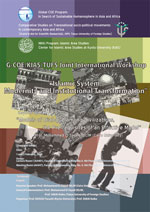
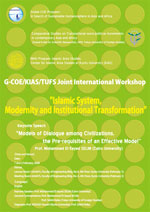
[Language] English
Keynote Speaker: Mohammed El-Sayed SELIM(Cairo University)
General Commentators: Mohammed El-Sayed SELIM and SAKAI Keiko(Tokyo University of Foreign Studies)
Organizers: KOSUGI Yasushi(Kyoto University) and SAKAI Keiko
February 1 (Fri.)
15:00-15:10 Opening
15:10-16:40 Session 1
Chair: TONAGA Yasushi(Kyoto University)
(Speakers)
Idiris DANISMAZ(Kyoto University)
''Applied Ethical Perspective in Turkish Sufi Exegesis: Ismail Haqqi
Bursawi's(d.1725) Ruh al-Bayan''
MARUYAMA Daisuke(Kyoto University)
''What Is Wali? : In the Tradition of Islamic Theology''
KINOSHITA Hiroko(Kyoto University)
''Transformation of the Islamic Network between Middle East and
Malay-Indonesian World:Historical Observation''
16:40-16:55 Coffee break
16:55-18:25 Session 2
Chair: TONAGA Yasushi(Kyoto University)
(Speakers)
Waheeb AL-ERYANI(Tokyo University of Foreign Studies)
''State Legitimacy and Secession Calls in the South of Yemen"
YASUDA Shin(Kyoto University)
''The Pilgrimage to the Shi'ite Mausoleums in Contemporary Syria''
HIRAMATSU Aiko(kyoto University)
''Islam and Democratization in Kuwait''
February 2 (Sat.)
11:00-12:30 Keynote Speech
Mohammed El-Sayed SELIM
''Models of Dialogue among Civilizations, the Pre-requisites of an
Effective Model''
12:30-13:30 Lunch
13:30-15:00 Session 3
Chair: KOSUGI Yasushi
(Speakers)
YAMAO Dai(Kyoto University)
''Cooperation and Rivalry among the Iraqi Islamic Parties: An Analysis
of Ideological and Political Orientations in the 1980s''
HORINUKI Koji(Kyoto University)
''Islam, Arabness and State Formation: A Debate on the Demographic
Imbalance in the UAE''
Housam DARWISHEH(Tokyo University of Foreign Studies)
"Political Activism under Mubarak's Authoritarian Electoral Engineering
in the 1980s''
15:00-15:15 Coffee break
15:15-16:45 Session 4
Chair: KOSUGI Yasushi
(Speakers)
TOBINA Hiromi(Kyoto University)
''To Maintain Jerusalemite ``Rights'': Palestinian Lives under the
Threat of House Demolition''
KURODA Kenji(Kyoto University)
''The Institution of Marji` al-Taqlid after the Islamic Revolution in
Iran''
HIRANO Junichi(Kyoto University)
''Beyond the Sunni-Shiite Dichotomy: Rethinking al-Afghani and His
Pan-Islamism''
16:45-17:45 Session 5
Chair: KOSUGI Yasushi
(Speakers)
Esen URMANOV(Tokyo University of Foreign Studies)
''Islam in Central Asia"
INTISAR(Tokyo University of Foreign Studies)
Forced Migration/ Displacement Crisis in the Middle East with more focus
on the case of Iraq
17:45-17:50 Closing
"Private Faces of Power and Institutions in Southeast Asia"(2007/12/6-7)
Date: December 6 (Thu.) - 7(Fri.),2007
Venue:Royal City Hotel, Bangkok
Title:"Private Faces of Power and Institutions in Southeast Asia ".
December 6
10.00 AM - 12.00 AM: Plenary Session
Opening Speech:
- Professor Anon Boonyaratavej, Secretary to the NRCT
- Professor Kou Ikejima, Director of JSPS Bangkok Office
- Professor Kosuke Mizuno, Director of CSEAS, Kyoto University
Keynote Speech:
- Professor Benedict Anderson: "Are networks and extended families the enemies of serious democracy in SEA Asia- The crisis of political parties"
- Professor Surapon Nitikraipot: "Globalization and Asian Societies"
12.00 AM - 1.30 PM: Lunch
Room 1 Project 7: "Social Resistance and Good Governance"
1.30 PM - 3.00 PM: Individual Paper (30 min/each)
- Naruemon Thabechumpon (Chulalongkorn University) on anti-dam movements
- Nalinee Tanthuwanit (Thammasat University) on anti-dam movements
- Krisada Boonchai (Thammasat University) on community environmental movements
3.15 PM- 4.30 PM: Comments by:
- Fumio Nagai (Osaka City University)
- Junko Hoshi (University of Tokyo)
Discussion
Room 2 Project 8: "Changing Families"
1.30 PM - 4.30PM: Individual Papers "Families": Internal Workings and Cultural Reproduction
- Kwanchewan Buadaeng: "The Ancestor Spirit Cults and Family Relation: Case of Karens in Northern Thailand"
- Yoko Hayami: "Family" and Cultural Reproduction against Mobility and Transience: Three cases of Karen across the border"
- Yunita Wiharto: The Persisting and Changing Family in Java: Empowering Women, Changing Power Relations-
- Aroonrut Wichienkeo: (Short introduction on Northern Thai manuscripts and reference to family-related issues)
Discussion
Room 3 Project 9(1): "Comparative Asian Economic History: Institutions and Environment
1.30PM - 4.30PM
- Kaoru Sugihara: "Labor-intensive Industrialization in Global History: Some thoughts on Southeast Asia"
- Porphant Ouyyanont: "Cheap Labor and the Industrialization of Bangkok after 1945"
- Somboon Siriprachai: "The Postwar Economic Development in Thailand: An Overview"
- Koichi Fujita: "Worlds Apart: Peasants in Japan and Agricultural Laborers in Bangladesh"
- Mya Than: "Myanmar's Agriculture in Historical Perspective"
Discussion
Note: other committed participants include Professor Kenta Goto and Professor Pasuk Pongpaichit
4.45PM -6.00PM: Joint Discussion of the 3 Projects (Introduction of each session)
6.30PM: Dinner Hosted by Prof.Dr. Surapon Nitikraipot (Rector of Thammasat University)
December 7 9.00 AM - 12.00AM: Project Sessions
Room 1 Project 7: "Social Movements"
9.00 AM - 10.15AM: Individual Papers (30 min/each, except Prof. Somchai, 15 min)
- Boonlert Visetpricha (Thammasat University) on homeless issues
- Somchai Phathananunth (Thammasat University) on farmer's movements
- Dianto Bachriadi (Agrarian Resource Center, Indonesia) on land occupation issues
10.15AM - 11.30AM: Comments by:
- Fumikazu Ubukata (Kyoto University)
- Teresa E. Tadem (University of the Philippines)
11.30AM - 12.30PM: Individual Papers (30 min/each)
- Fumikazu Ubukata (Kyoto University): "Let's Get Villagers Involved in: "The Strategic shift of Raw Material Procurement and Its Consequences in the Thai Pulp Industry"
- Teresa E. Tadem (University of the Philippines): "Localizing and Transnationalizing Governance and Democratization: The anti-globalization campaigns in the Philippines and Thailand on anti-globalization campaign"
Discussion
Room 2 Project 8: "Changing Families"
9.00AM - 12.00AM: Individual Papers "Transnational Families"
- Odine de Guzman: "Families in Transition: International Labor Migration, Gender and the Romance of the ‘Filipino Family'.
- Ratana Boonmatya
- Patcharin Lapanun: "Perception and Negotiation: Transnational Marriage and Local Isan Villagers"
- Wu Xiao An
Discussion
Room 3 Project 9(2): "Political Networks in Asia"
9.00AM - 12.00AM
- Onimaru Takeshi: "What we try to do in political networks in Asia"
- Hisasue Ryoichi: " The bank of Canton" in Sun Yat-Sen's Revolutionary Movement, Fund Raising and Overseas Chinese Networks"
- Joel Ariate
- Zuraida Mae D. Cabilo: " From Supermarket Shelves to the Halls of Policaymaking: The Philippines Fair Trade Forum (PFTF) as a political network"
- Sharon Quinsaat
Discussion
Note: other committed participants include Dr. Nobuhiro Aizawa
12.00AM - 1.30PM: Lunch
1.30PM - 5.00PM: Afternoon Session (separate sessions in 3 rooms)
Room 1 Project 7: "Social Movements"
1.30PM - 2.15PM: Individual Papers (15 min/each)
- Junko Hoshi (University of Tokyo): "The Community-based anti-dam movement under democratization and nationalism: The transition of social movement in Meinung, Taiwan"
- Kosuke Mizuno (Kyoto University) on labor movement
- Hetifah Sjaifudian (Akatiga-Center for Social Analysis, Indonesia) on citizen forum
2.15PM - 3.30PM: Comments by:
- Naruemon Thabechumpon (Chulalongkorn Univeristy)
- Masaaki Okamoto (Kyoto University)
Discussion
3.30PM-5.00PM: Individual Papers (30 min/each)
- Fumio Nagai (Osaka City University) on local government in the aging society
- Je Seong Jeon (Chonbuk National University, South Korea) on Korean connection in the movement
5.00PM - 6.00PM: Comments by:
- Kosuke Mizuno (Kyoto University)
- Vienrat Nethipo (Chulalongkorn University)
Discussion
Room 2 Project 8: "Changing Families"
1.30PM- 3.30PM: Individual Papers on "Family, Law and Ideology"
- Sulistyowati Irianto: "Changing Legal Position of Women in Inheritance with gendered perspective in Law (Case study among the Batak Women in Indonesia"
- Koizumi Junko (Kyoto University): "Family and Inheritance in Siam: Legal, Reforms, and Court case in the late Nineteenth and Early Twentieth Centuries (provisional)"
- Chalidaporn Songsampan (Thammasat University): "Private Family, Public Contestation: Debates on Sexuality and Marriage in the Thai Parliament"
- Yeh Chienwei (Ibaragi University)
3.45PM - 4.45PM: Individual Papers on "Privatized Space and Public Power"
- Patricio Abinales: "Violence in the Golden Ghetto and the Unraveling of the Filipino Elite Family"
- Chalong Soontravanich
5.00PM - 6.00PM: Integration and Discussion
6.30PM: Dinner Hosted by Assoc.Prof.Dr. Chulacheeb Chinwanno (Vice Rector for International Affairs, Thammasat University)
"Transborder Environmental and Natural Resource Management"(2007/12/5-7)
Date: December 5-7, 2007
Venue: Kyoto University International Conference Hall
Many of the world’s environments and their natural resources can only be preserved or used sustainably through concerted efforts that involve collaboration between parties across national boundaries. Such transborder environmental and natural resource management is becoming increasingly important to assure the survival of the world’s natural assets and reduce political, social and economic costs from transborder environmental and natural resource conflicts.
To contribute to the scientific understanding of the topic CIAS, CML, CAPAS and UNU organize a symposium where specialists in transborder environmental and natural resource management analyze individual transborder cases from Asia, Europe and elsewhere to assess the scope of the topic, identify general patterns and communalities and develop better theoretical underpinnings that may guide some of the cooperation, negotiations and conflict mediation that are likely to increase in years to come.
The symposium will be held between December 5 and 7 at the Kyoto University International Conference Hall. The 21 confirmed participants who present cases studies to guide the discussions are from Asian and European countries. The sessions on December 5 and 6 are open for the public.
|
DECEMBER 5
|
||
| 9.00 | REGISTRATION | |
| 9.30 | OPENING –Tanaka, Koji and Persoon, Gerard | |
|
SESSION ONE – MULTILATERAL ENVIRONMENTAL COOPERATION |
||
| 10.00 |
1
|
He, Shengda |
| 10.30 |
2
|
Sriburi Thavivongse |
| 11.00 | COFFEE BREAK | |
| 11.30 |
3
|
Lei, Zhuning |
| 12.00 |
4
|
Zhang, Luo-Ping |
| 12.30 | LUNCH | |
|
SESSION TWO – TRANSBORDER CONSERVATION |
||
| 14.00 |
5
|
Gerard Persoon |
| 14.30 |
6
|
Andres Masipiquena |
| 15.00 |
7
|
Gaku Ohashi |
| 15.30 | TEA/ COFFEE BREAK | |
| 16.00 |
8
|
Marcus Schaller |
| 16.30 |
9
|
Johan Iskandar |
| 17.00 |
10
|
Jeong, Dai-Yeun |
| 17.30 | SUMMARY OF THE DAY AND CLOSING – Wil de Jong | |
| 19.00 | WELCOME DINNER | |
|
DECEMBER 6
|
||
|
SESSION THREE – TRANSBORDER RIVER MANAGEMENT |
||
| 9.00 |
11
|
Xuan, Vo Tong |
| 9.30 |
12
|
Denyse Snelder |
| 10.00 |
13
|
Darryn McEvoy |
| 10.30 | COFFEE | |
|
SESSION FOUR – TRANSNATIONAL MARINE RESOURCES MANAGEMENT |
||
| 11.00 |
14
|
Kuan-Hsiung Wang |
| 11.30 |
15
|
Jun Akimine |
| 12.00 |
16
|
Yann-huei Song |
| 12.30 | LUNCH | |
|
SESSION FIVE – THE STATE AND BORDERLANDERS |
||
| 14.00 |
17
|
Serge Bahuchet & Rebecca Hardin |
| 14.30 |
18
|
Noboru Ishikawa |
| 15.00 |
19
|
Dave Lumenta |
| 15.30 | TEA COFFEA BREAK | |
| 16.00 |
20
|
Wil de Jong |
| 16.30 |
21
|
Koji Tanaka |
| 17.00 |
22
|
Masayuki Yanagisawa |
| 17.30 | SUMMARY OF THE DAY – Gerard Persoon | |
| 17.45 | SUMMARY OF THE EVENT AND CLOSING OF PRESENTATION SESSIONS | |
>>http://www.cias.kyoto-u.ac.jp/index.php/news_detail/id/97
Research Reports;
On December 5-7, 2007, a symposium on the theme of “Trans-border Environmental and Natural Resource Management” was held in the Kyoto University Clock Tower Centennial Hall, featuring presentations and debates regarding problems created worldwide – in Asia, Africa, Europe, and the Americas – by the presence of borders. It was shown, through case studies on the significant impacts on local societies of economic areas that stretch beyond borders, such as water damage caused in downstream areas by upstream dams, cross-border environmental pollution, and the indiscriminate use of resources caused by a lack of governance in border regions. That in today’s world, where human activities are growing larger in scale, it is imperative, in considering the humanosphere and sustainable development, to examine borders and the movements of people related to them. The fact that most of the participants from East Asia and continental Southeast Asia brought up relations with China as one trans-border issue was deeply intriguing, as it demonstrated that the presence of China is growing in that region, and it made us consider the possibility that changes in the humanosphere in continental Southeast Asia, which has a long border with China, will continue to accelerate. (Hoshikawa Keisuke)
"LIPI SOUTHEAST ASIAN FORUM"(International Confernce/International Symposia・Initiative 3 Seminar)
Date: 26(Monday)-27(Tuesday) November 2007
Venue: Gedung Widyagraha Lt. 1, LIPI Jl. Jendral Gatot Subroto Kav. 10, Jakarta
Organized by:
・Kyoto University = GCOE(In Search of Sustainable Humanoshere in Asia and Africa)
・HAKU (Himpunan Alumni Kyoto University Indonesia)
・LIPI (Indonesian Institute of Sciences)
"LIPI SOUTHEAST ASIAN FORUM" (2007/11/26-27)
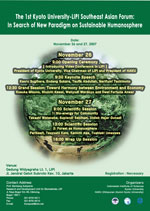
THE FIRST KYOTO UNIV. LIPI SOUTHEAST ASIAN FORUM:sustainable humanosphere in Indonesia
Date: 26(Monday)-27(Tuesday) November 2007
Venue: Gedung Widyagraha Lt. 1, LIPI Jl. Jendral Gatot Subroto Kav. 10, Jakarta
Organized by:
- Kyoto University = GCOE(In Search of Sustainable Humanoshere in Asia and Africa)
- HAKU (Himpunan Alumni Kyoto University Indonesia)
- LIPI (Indonesian Institute of Sciences)
Program:PDF>>
【Research Report】
Problems and solutions from socio-economic & environmental perspectives
|
PROBLEMS |
SOLUTIONS |
|
Two critical problems face the Tanjung Punting National Park: (1) illegal logging and mining activities; (2) conflicts of interest between central and local governments (H. Hidayat) |
National Park Management: (1) collaborative management of reforestation programs, (2) law enforcement, (3) hard sanctions, and (4) socio-economic empowerment of local people (H. Hidayat) |
|
Benefits from forests are currently still dominated by benefits from timber, while erosion prevention and water arrangement benefit only in small measures (M. Bismark). |
The function of community forests located in the buffer zones of conservation areas is very important as (1) a forest conservation tool, (2) for forest rehabilitation, and for (3) community economy improvement (M. Bismark). |
|
State-based centralized forest policy neglects the role of local people living in and around forest area and has shown many failures (K.A. Petrus & M. Shimagami). |
In community forestry policy the forest is a basis of communities’ livelihoods, therefore they utilize the resources in a way that seeks harmony with the characteristics of the forest (K.A. Petrus & M. Shimagami). |
|
The crisis facing mankind: population explosion, energy crisis, and global warming (S. Kawai). |
Interdisciplinary research with a broader perspective is urgently required to solve such critical issues (S. Kawai). |
The scope for science and technology was identified as follows:
- The tropical region receives the highest concentration of solar energy which is the ultimate energy source of all organisms of earth and is the driving force of global atmosphere dynamics and of the production of plants (S. Kawai).
- Humanosphere science covers a wide range of research fields on the humanospere, from the ground, to the atmosphere, and the space for human existence (S. Kawai).
Research fields should:
- organize inter-disciplinary research projects that include (1) the evaluation of tree bio-mass production by tree growth analysis and remote sensing technology, (2) environmental monitoring and assessment through atmosphere and biodiversity observations, and (3) bio-technology for enhancing tree functions.
- develop the academic and technological solutions to establish a cyclical system of resources and energy in the region, and which supports the harmonization of ecology and economy.
Problem and resolution from the science and technology perspective
|
PROBLEMS |
RESOLUTIONS |
|
Global warming and deficiency of fossil fuels (T. Watanabe). |
Lignocellulosic bio-refinery plays a key role in replacing the oil-based chemical industry because bio-mass is a carbon-based renewable resource with large quantities of lignocellulosics (T. Watanabe). |
A number of observations add background to the perspectives identified during this 2 day forum. These observations are:
- There remains a big gap between bio-diversity conservation and large-scale plantation development;
- The quick answer is to give up on conservation efforts and continue to do both in the present way, so we must jump at this challenge;
- Environmental conservation requires reconsidering the basics such as talun, vernacularism, and CF;
- Tree plantation and bio-technology have still to mature;
- Our thoughts on the humanosphere are still limited and we have to expand them to include the bio-sphere and geo-sphere;
- The time-scale for developments is a basic issue within the discussion; energy prices ultimately decided the feasibility of bio-fuel production by large-scale plantations;
- CF expires after 5 years, but there is a need to develop good forest for a longer period;
- Nobody thinks about the future of PSF;
- How to synthesize the differences in time-scale between the humanosphere, bio-sphere and geo-sphere may be a serious question.
The following perspectives for the future will be possible when supported by the Government politically and through law enforcement:
- Intensified biodiversity studies (E. Sukara);
- The development of sustainable humanosphere industries (K. Mizuno);
- Reforestation by forest-based communities (H. Hidayat; M. Bismark; K.A. Petrus & M. Shimagami).
- Bio-mass production from plantation forests (S. Kawai) and man-made forests as humanosphere components (Parikesit);
- The development of appropriate bio-energy (S. Sabiham; T. Watanabe; G. Wibawa; T. Sonobe) and tree bio-technology (T. Umezawa);
- Stopping the exploitation of timbers from natural forests, and utilizing more lesser known wood species for different purposes (W. Dwianto).
"Forest Stewardship and Community Empowerment" (2007/10/11-12)
Date:October 11 (Thu.) - 12(Fri.),2007
Venue:Kyoto International Community House (http://www.kcif.or.jp/en/index.html)
Forest Stewardship and Community Empowerment: Local Commons in Global Context
In the developing countries, 25% of forest area is currently being managed by communities, as “community forests” in a broad sense. This area has doubled during the past 15 years, and is forecast to double again in the next 15. The increase in the number of “community forests” is derived from the idea that by making forests community property, their multi-functionality can be maximized. It is not a new idea, considering that many forests were in fact shared in the past. More specifically, they belonged to all and to no one at the same time, and thus were under a form of “general ownership.” However, with modernization, the ownership of forests was clarified in statutory form, and the multi-functionality began to be neglected. “The significance of forests” depends on one’s position. There are times when interests collide. Under such circumstances, the forest’s “owners” begin to pursue their own profits, and the long-term profits that the future of the earth as a whole depend upon were neglected, as can be seen by the loss of the public function of forests. This degradation of forests is a classic example of the “tragedy of the commons,” where a handful of people pursue short-term profits while human beings as whole suffer in the long term. Movements to “revive community forests” around the world are based on reflection on these past actions. At this symposium, after examining past methods for managing community forests, such as Japanese iriai community forests, we will discuss how to maintain and utilize community forests in today’s context. In order to maintain community forests and to use them in a sustainable way, a “sound” community is an absolute necessity. Communities differ from one another. Therefore, we will hear reports on the realities of community forests in different places such as India, Mexico, China, Southeast Asia, and Africa. Based upon these presentations, we hope to share ways for global community forests, and ideas similar to that of a global commons. (from the seminar announcement)
"The 2nd International Workshops"(2007/09/21)
Date: 21 Sep ,2007
In the Global COE program, we will aim to build a database for a humanosphere using a GIS (geographical information system), with the goal to envisage technology and institutions that will make a sustainable humanosphere possible in Asian and African regions in the time span of one century. At this workshop, based on interim findings of the four research projects conducted by the Center for Integrated Area Studies in the last fiscal year, we examined the expected contents of the database and the expected development to be gained by the database analysis. They are: “GIS applications to protect the safety and security of a society with multiple hazards,” “technological integration and institutional design for the sustainable use of mountain ecological resource – focusing on Southeast Asia,” “expanding regional information studies to unify the subsurface structure and ecology of nature, society, and human beings – in the case of urban areas of Southeast Asia,” and “formulating a database for humanosphere simulation.” The significance of building a database on the humanosphere of individual regions is that particularly in case of a large-scale disaster, it will function as a foundation that can offer, in real time, up-to-date geographical information on the scale of damage and need for reconstruction. In short, the humanosphere database itself will contribute to creating the sustainability of the local community. It was also pointed out that there is a need to build a database that reflects the current status of the sustainable humanosphere in order to clarify a regional unit that can envision a sustainable humanosphere, or regional divisions based on the humanosphere. The concept of a sustainable humanosphere can expand in time and space. The workshop was meaningful in having participants share this concept. From now on, we can narrow our focus to the path of technological progress and the characteristics of the humanosphere, which should become the key elements for designing a sustainable humanosphere, and further the need to clearly define the structure and components of the humanosphere. (Sato Takahiro )
"The 1st International Workshops "(2007/07/31)
Date: 31 July ,2007
This workshop was coordinated by Professor Hayashi Takahisa, a member of the Global COE. Based on the premise that plantation forests in Southeast Asia are promising production bases for bioethanol, four reports were given on the possibility of breeding using molecular biology and other techniques. Plant biomass, mainly from corn and sugarcane, is currently used as raw materials for bioethanol, but since these crops can also be used as food and feed, there is a need to develop low cost production of cellulosic ethanol using such timber. Along with domestically produced raw materials, there is a potential to convert pulp production based on plantation forests in Southeast Asia, especially acacia forests, to ethanol production, but with technological development necessary to achieve this. Professor Watanabe Takashi gave a report on how the American chemical industry is pouring massive R&D funds in developing a new key industry of “biorefineries” replacing oil refineries. Biomass, as a carbon-neutral resource, has the potential to become a key industry of the 21st century, by systematically producing chemical products, fuel and energy. Consequently, Japan needs to create a pan-Asian network covering Southeast Asia. (Sugihara Kaoru)

